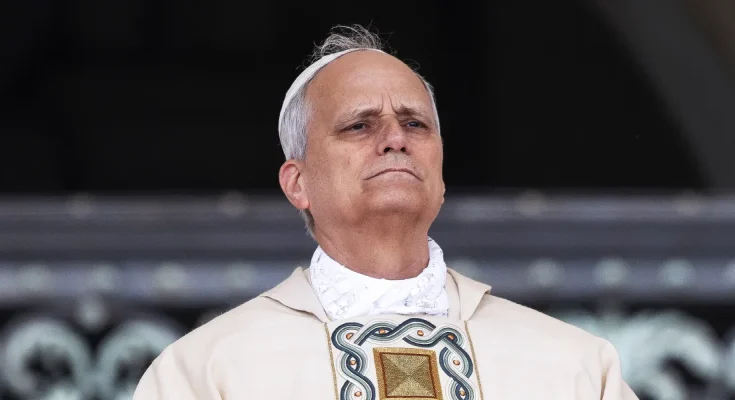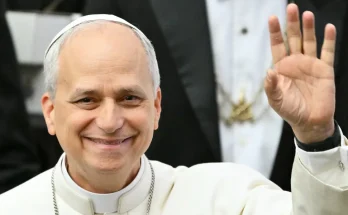When Pope Leo XIV stepped into the role of leader of the Roman Catholic Church, it marked more than just the beginning of a new papacy.
Pope Leo XIV’s inauguration marked a turning point for Catholics worldwide. As the first American elected to the papacy, his rise was already historic. But it was the way he chose to begin his role — not merely who he was — that captured the world’s attention.
From a bold entrance to unexpected choices in language and tone, Pope Leo XIV’s first days suggested a papacy willing to depart from tradition.
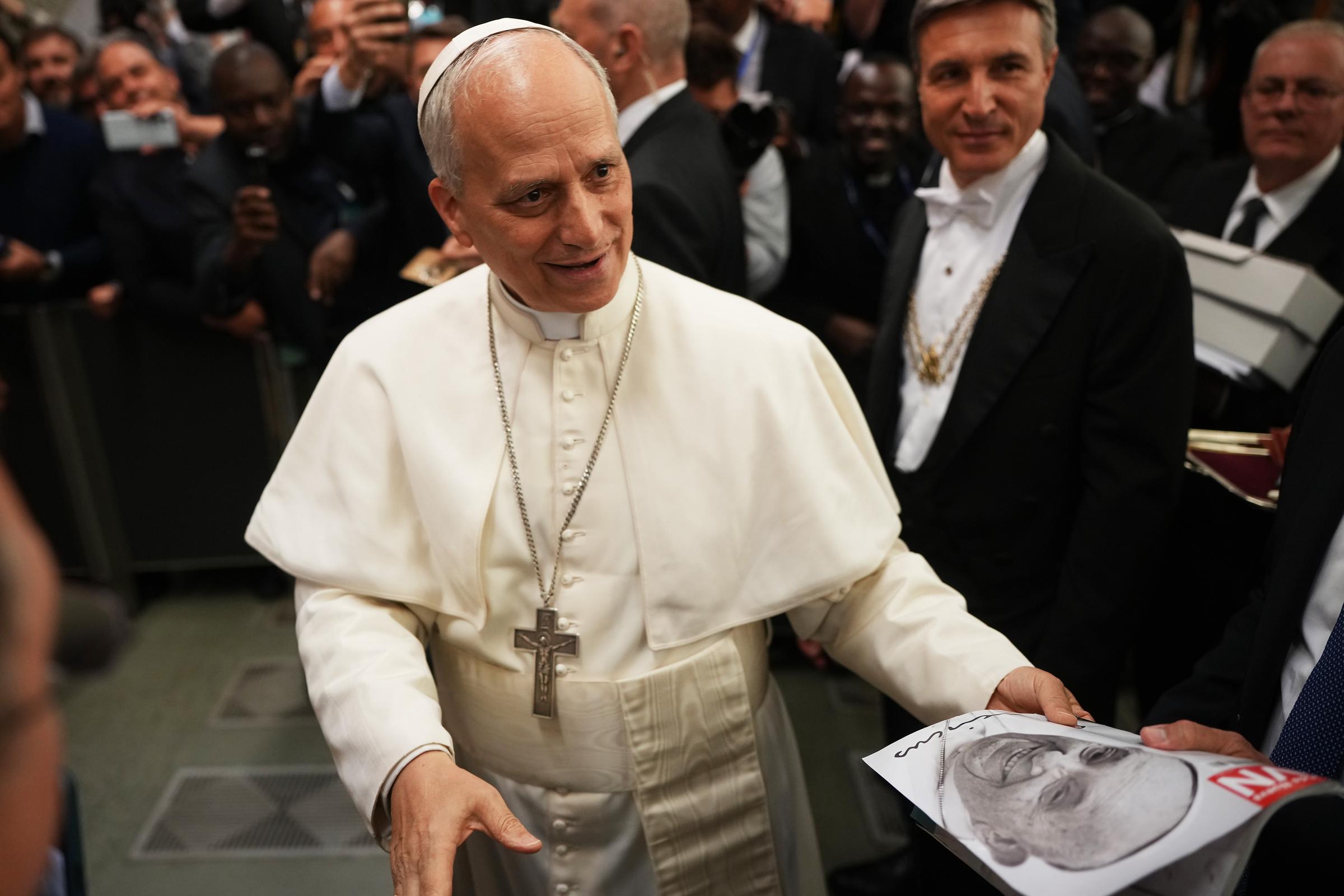
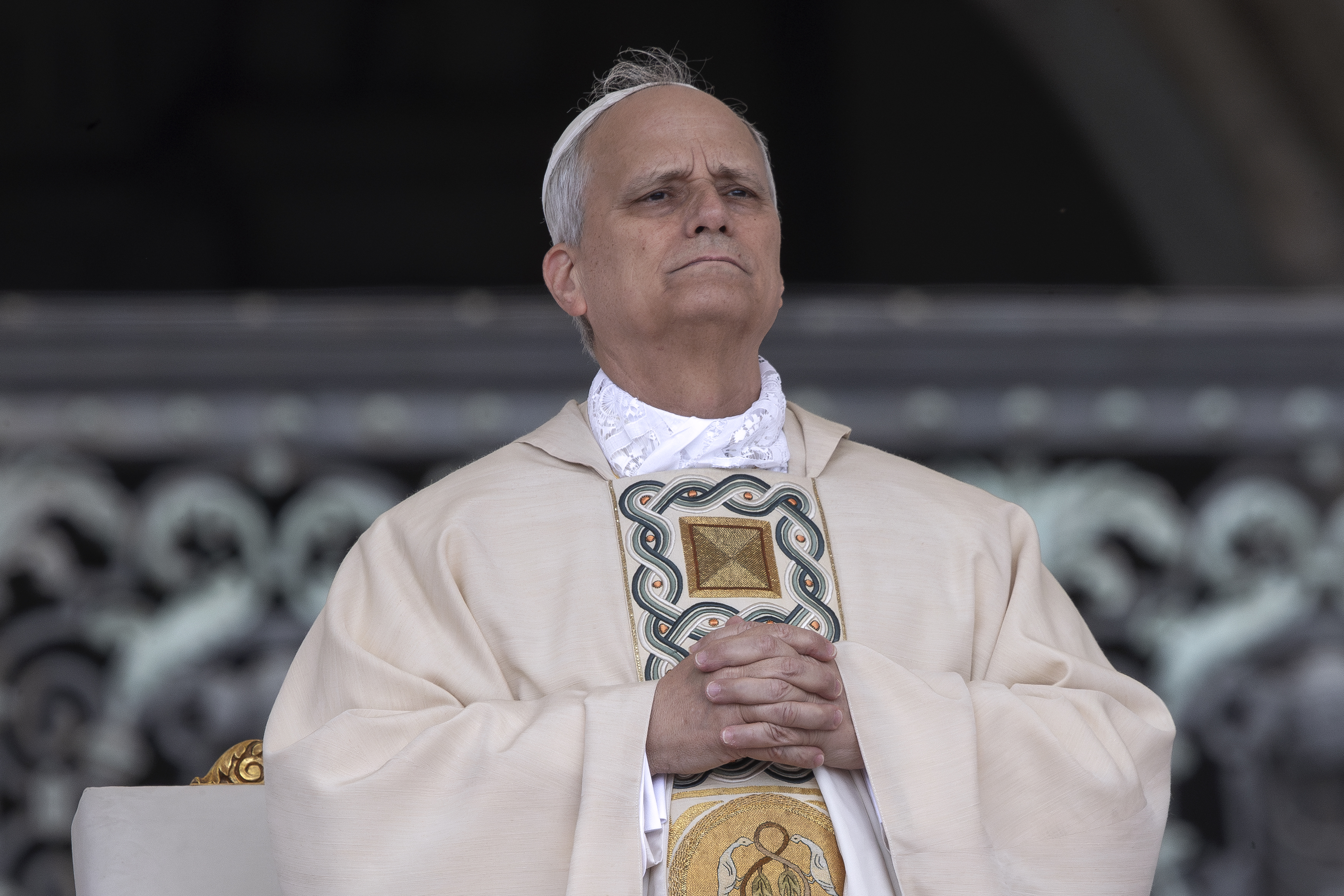
Who Attended: Diplomacy and Ceremony in St. Peter’s Square
The Inauguration Mass on May 18, 2025, followed the death of Pope Francis on April 21. In attendance were royal and political figures from across the world.
Princess Charlene of Monaco, Queen Letizia of Spain, and Queen Mathilde of Belgium attended with their husbands — Prince Albert, King Felipe VI, and King Philippe, respectively — while other royal representatives included Grand Duchess Maria Teresa of Luxembourg, Crown Princess Victoria of Sweden, and Queen Maxima of the Netherlands.
Also in attendance were Prince Edward of the United Kingdom, Canadian Prime Minister Mark Carney, Australian Prime Minister Anthony Albanese, and Ukrainian President Volodymyr Zelenskyy.
But even as dignitaries gathered from across the world to witness the historic moment, one highly anticipated figure was notably absent.
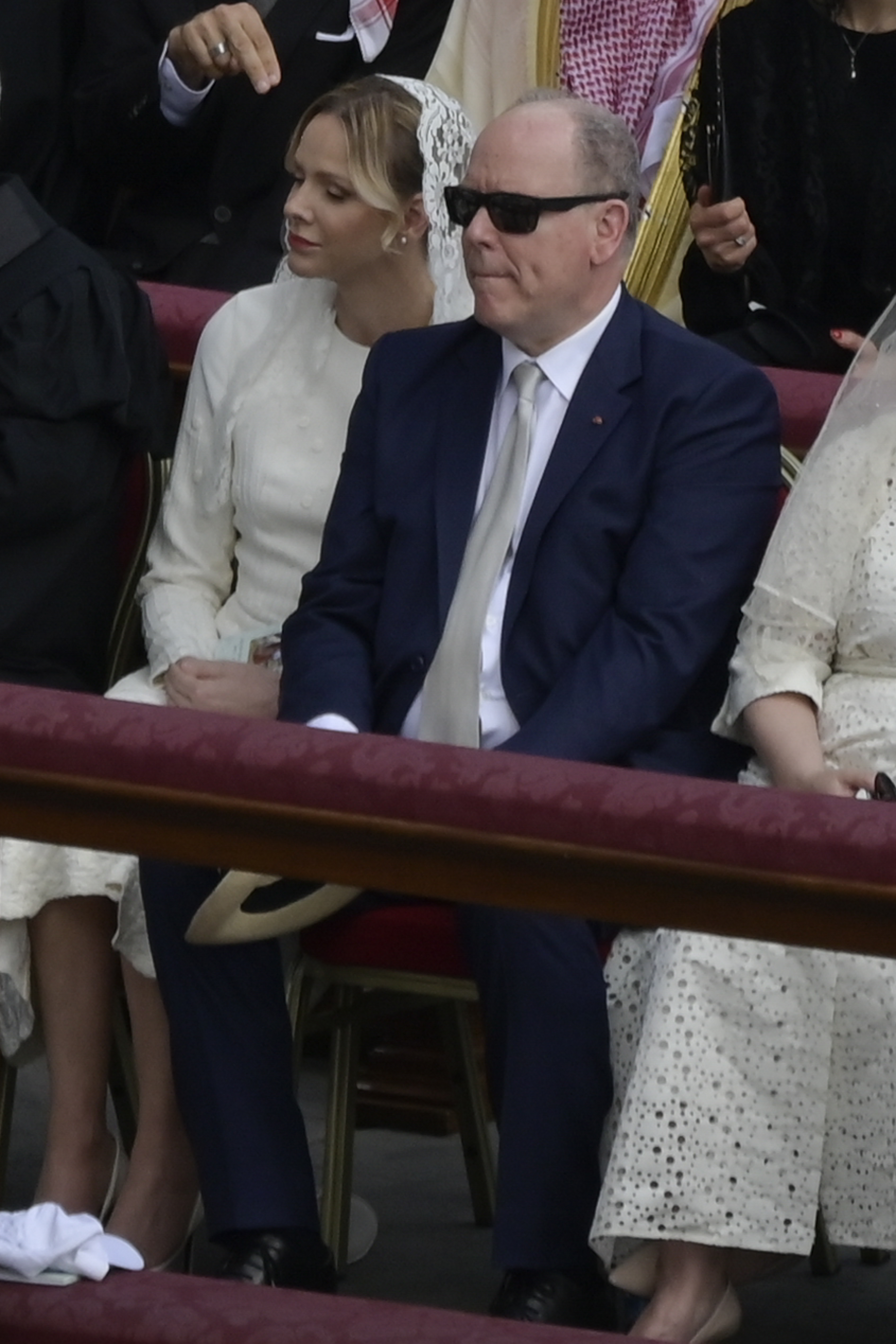
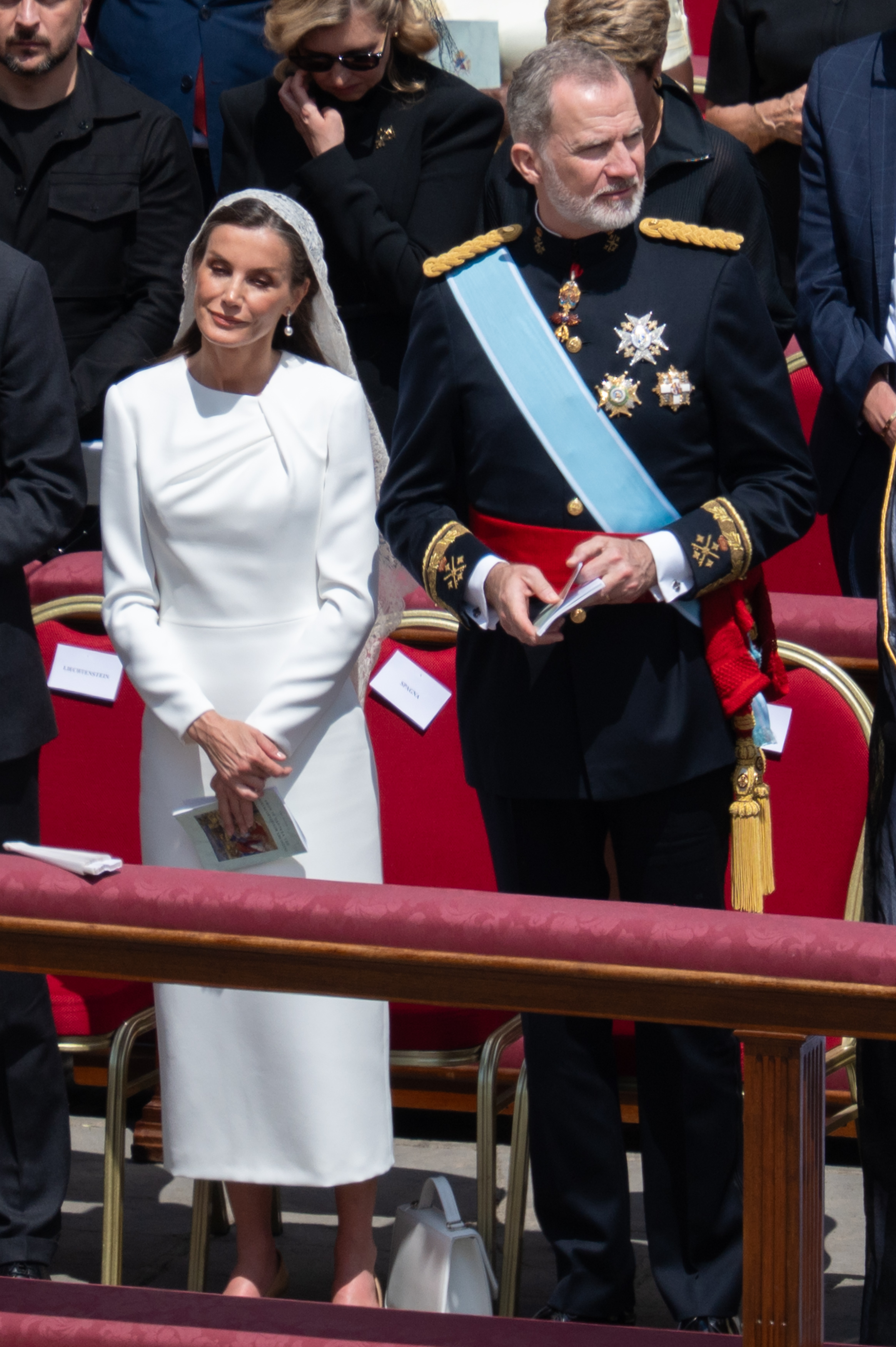
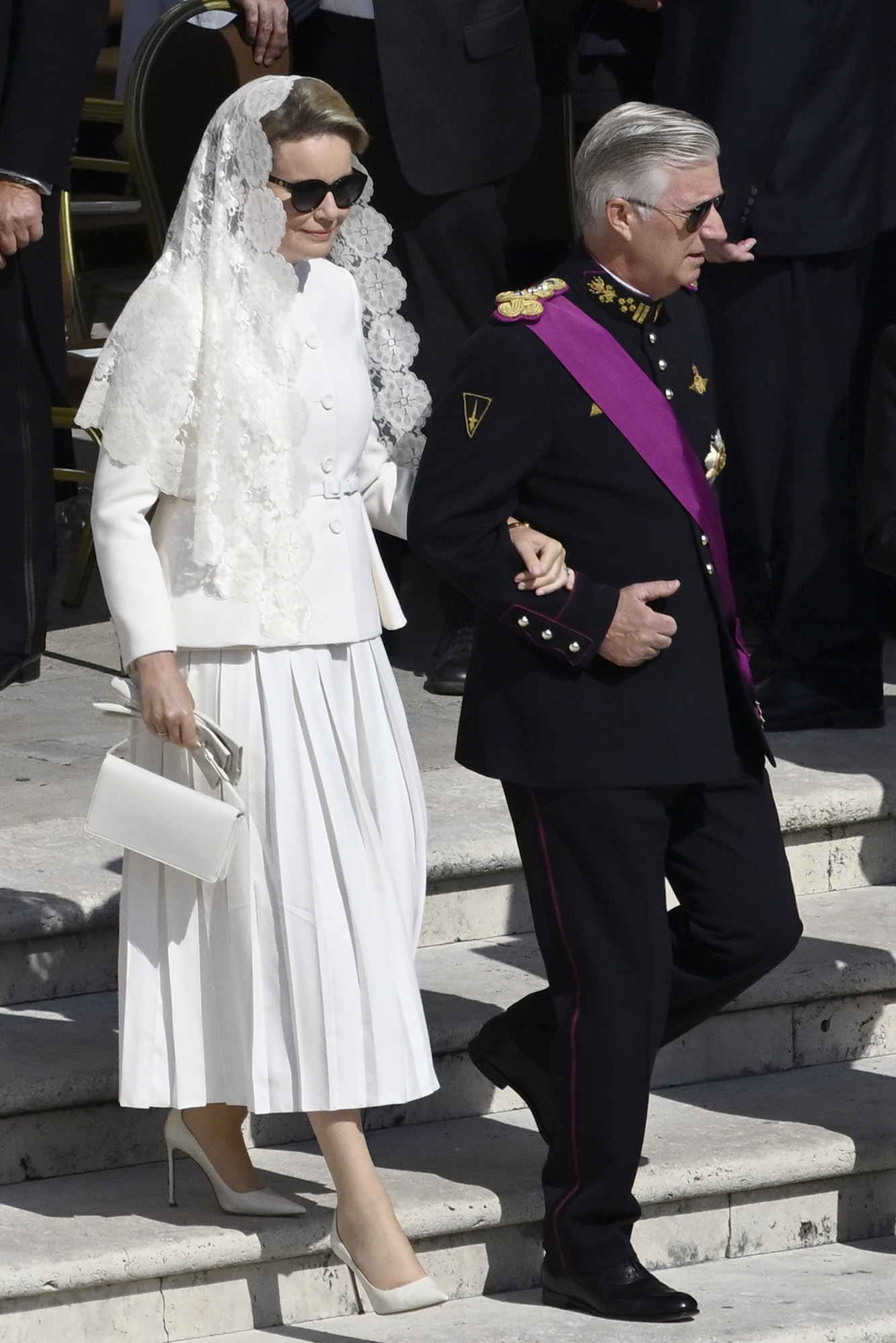
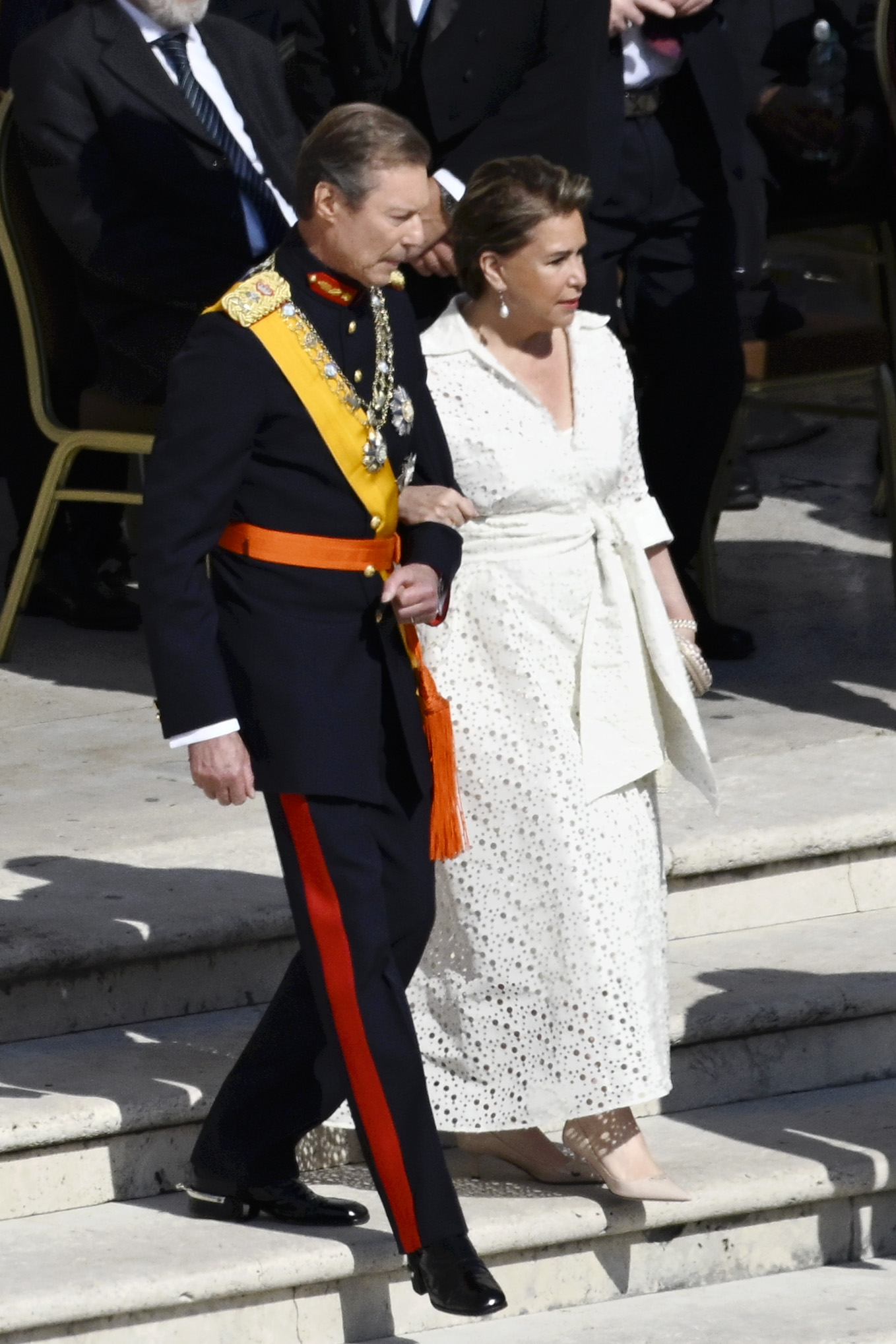
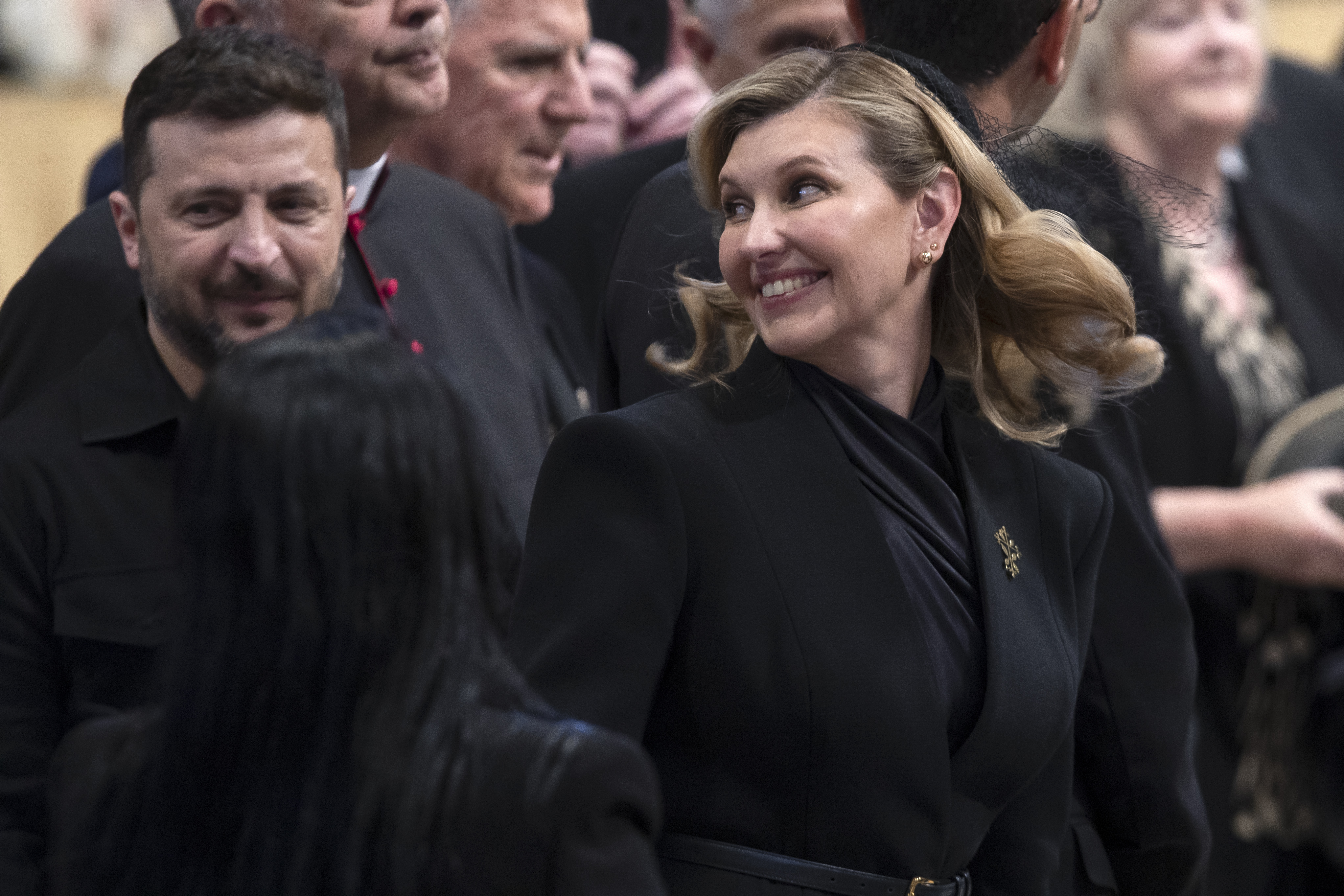
Who Did Not Attend: A Noticeable Absence from Washington
Despite publicly celebrating the election of an American pope, U.S. President Donald Trump did not attend the inauguration. He once described the Pope’s selection as a great honor for the United States and expressed hope of meeting him in what he called a meaningful moment.
While he was on his first major overseas trip of his second term — visiting Saudi Arabia, Qatar, and the United Arab Emirates — the U.S. was represented in Rome by Vice President JD Vance.
Although he had attended Pope Francis’s funeral in April, Trump’s decision not to be present for Pope Leo XIV’s inauguration left a noticeable gap. Still, it was the Pope’s own choices during the ceremony that ultimately defined the day.
“Congratulations to Cardinal Robert Francis Prevost, who was just named Pope. It is such an honor to realize that he is the first American Pope. What excitement, and what a Great Honor for our Country. I look forward to meeting Pope Leo XIV. It will be a very meaningful moment!”… pic.twitter.com/q6kNcSOqAT
— The White House (@WhiteHouse) May 8, 2025
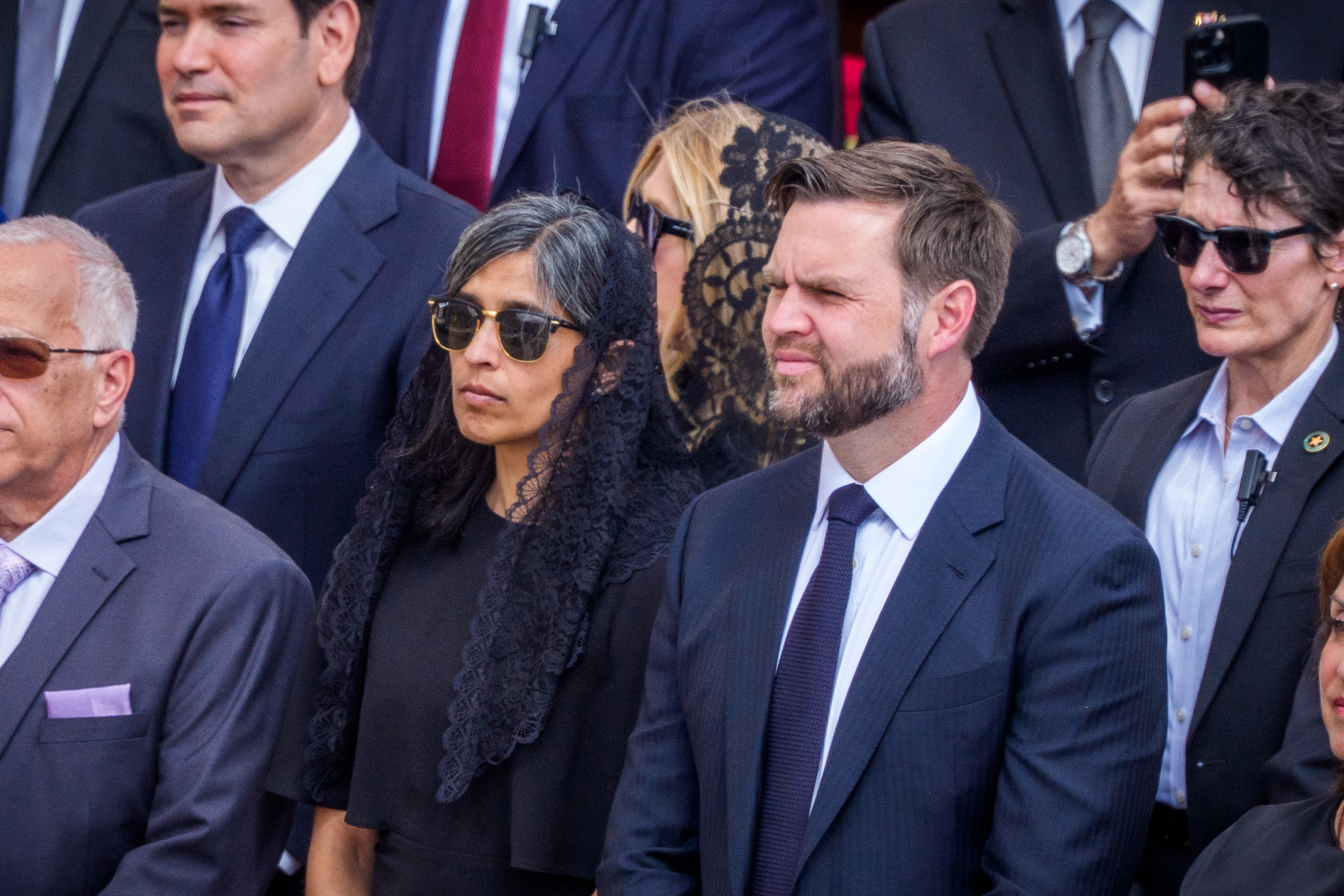
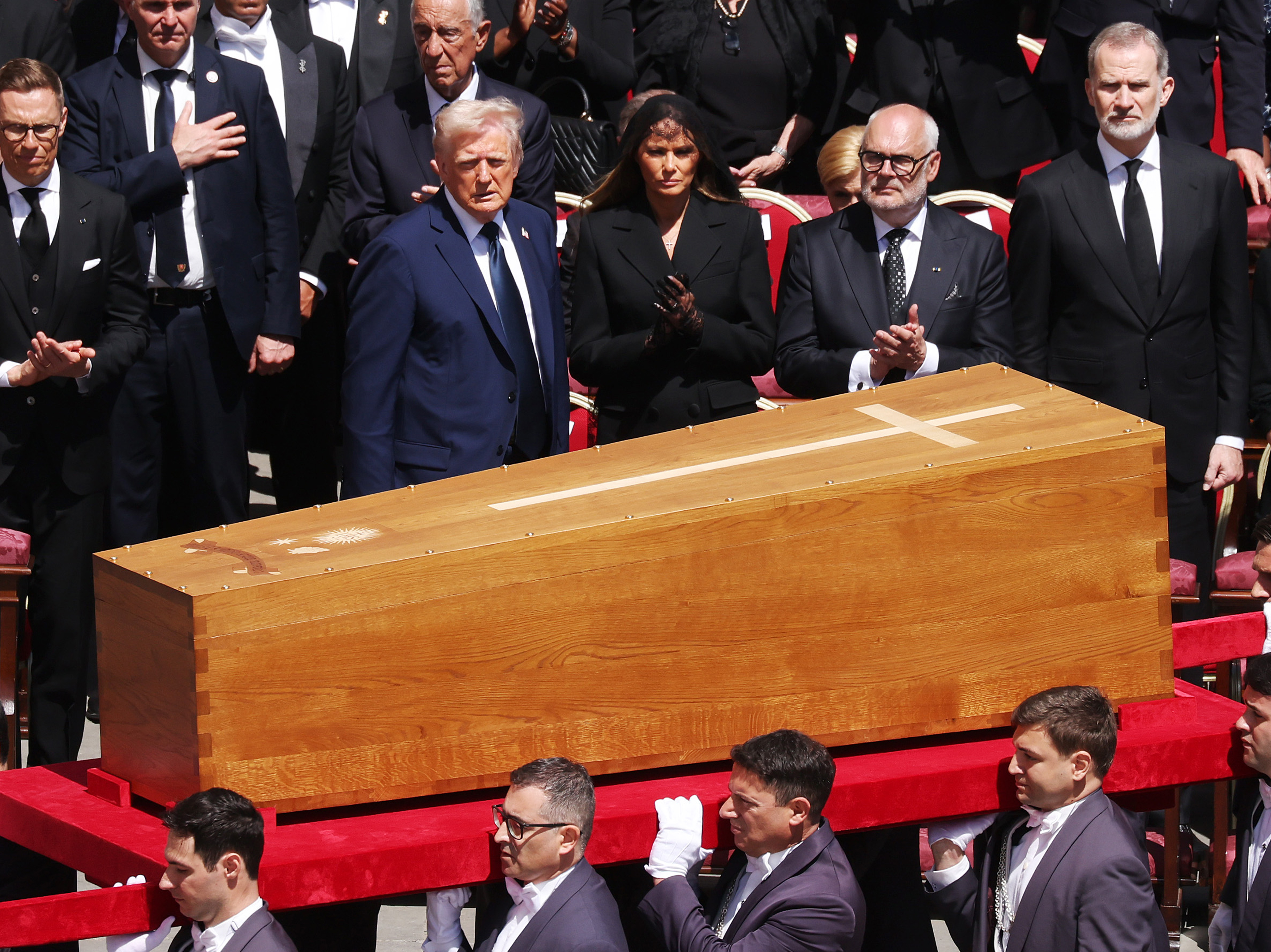
When Pope Leo XIV Broke the Rules
Around 200,000 people filled St. Peter’s Square to witness Pope Leo XIV’s inaugural Mass. Pilgrims, clergy, cardinals, and world leaders gathered under flags and cameras as the atmosphere surged with anticipation and applause.
He rode through the square in an open-back Popemobile, waving to the jubilant crowd. He chose to forgo the bulletproof enclosure that typically shields pontiffs, following the example of Pope Francis.
The move broke with standard protocol, a bold decision for a newly elected American pope navigating a volatile global stage.
He carried that same spirit of openness into his homily. Speaking before heads of state and royalty, he said, “Brothers and sisters, I would like that our first great desire be for a united Church, a sign of unity and communion, which becomes a leaven for a reconciled world.”
He invoked the example of St. Peter to describe the kind of leadership the papacy should embody, “Peter must shepherd the flock without ever yielding to the temptation to be an autocrat, lording it over those entrusted to him. On the contrary, he is called to serve the faith of his brothers and sisters, and to walk alongside them.”
Pope Leo XIV also promised to reject the use of “religious propaganda” in Church leadership. His message underscored a pontificate committed to walking with others, not ruling above them.
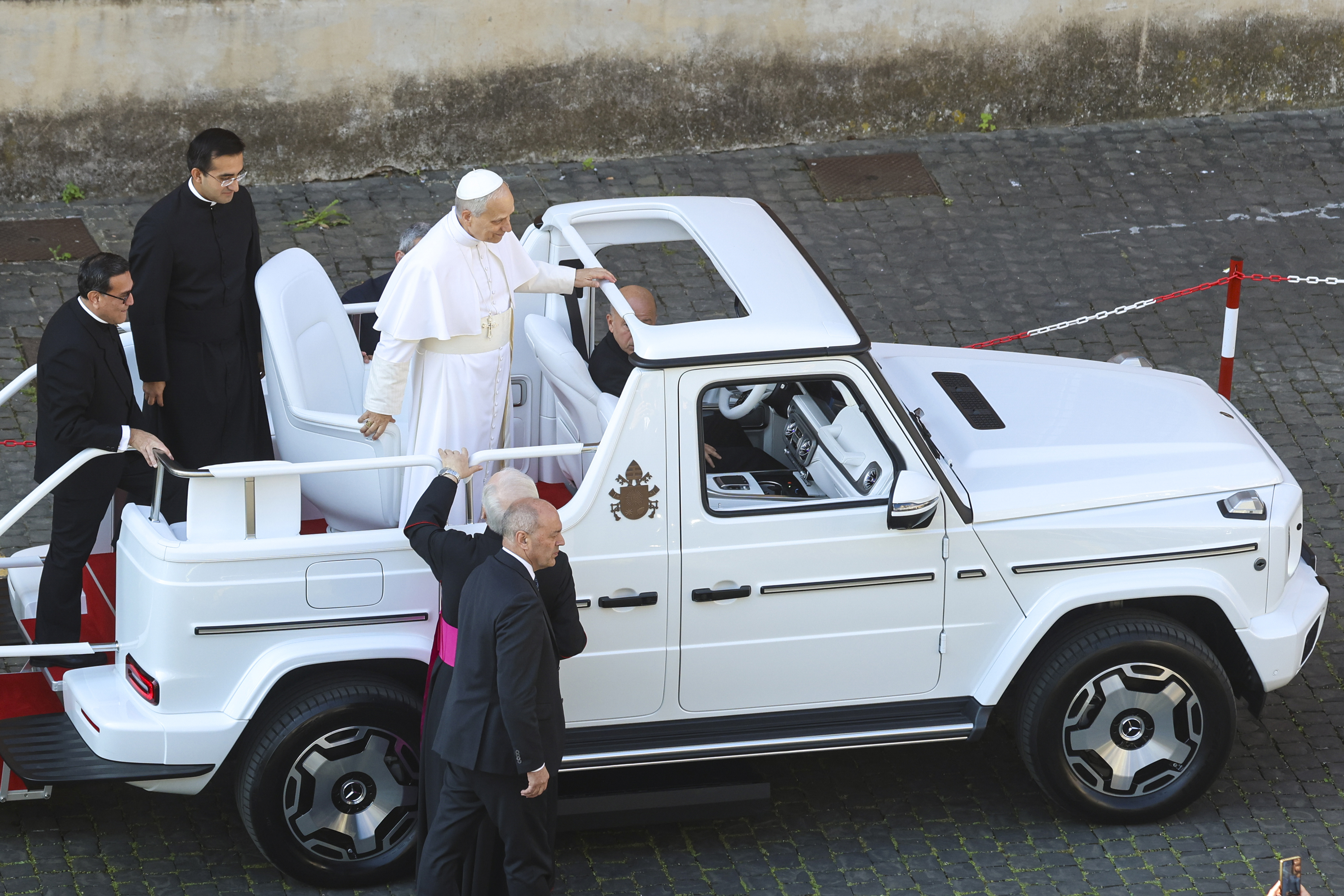
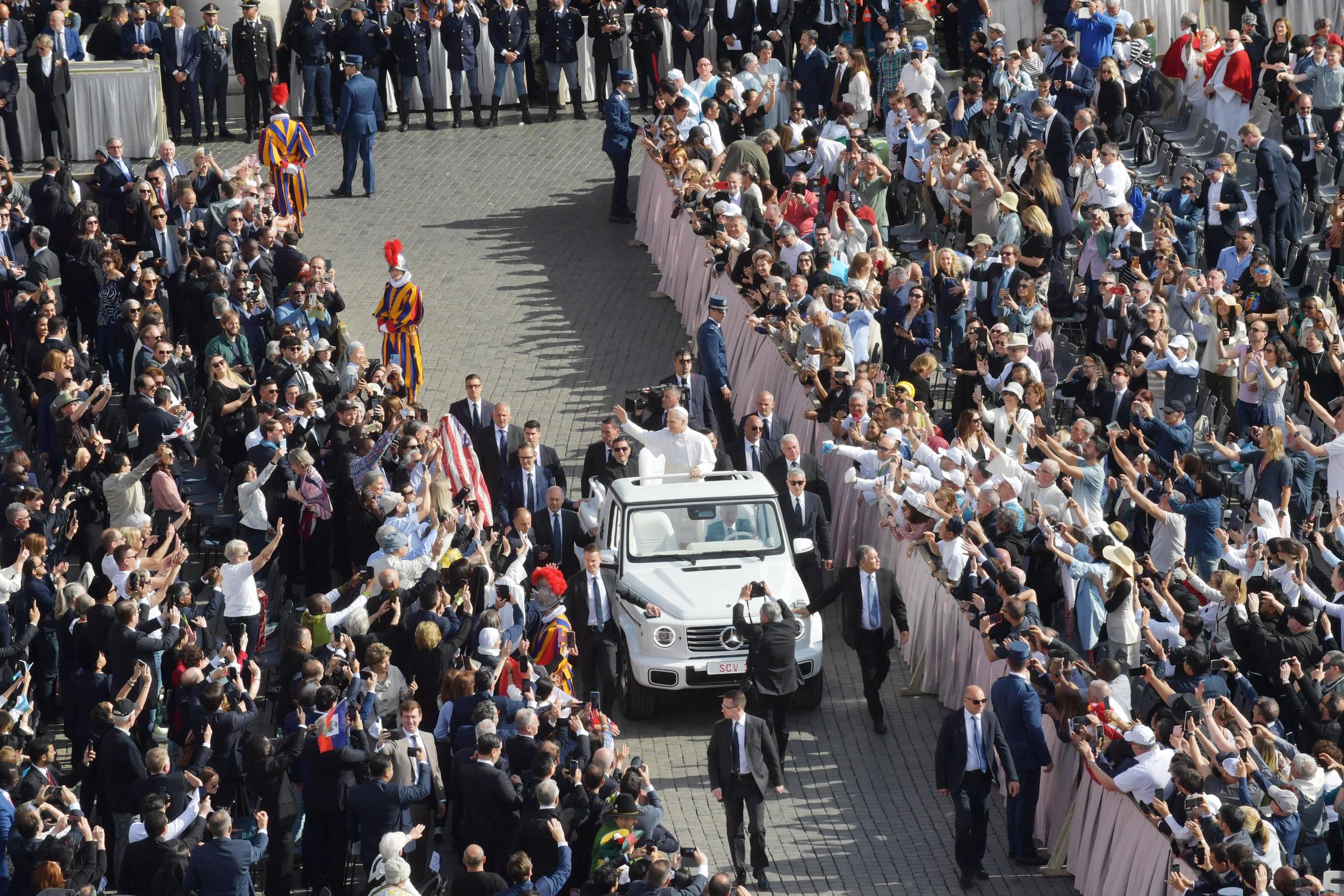
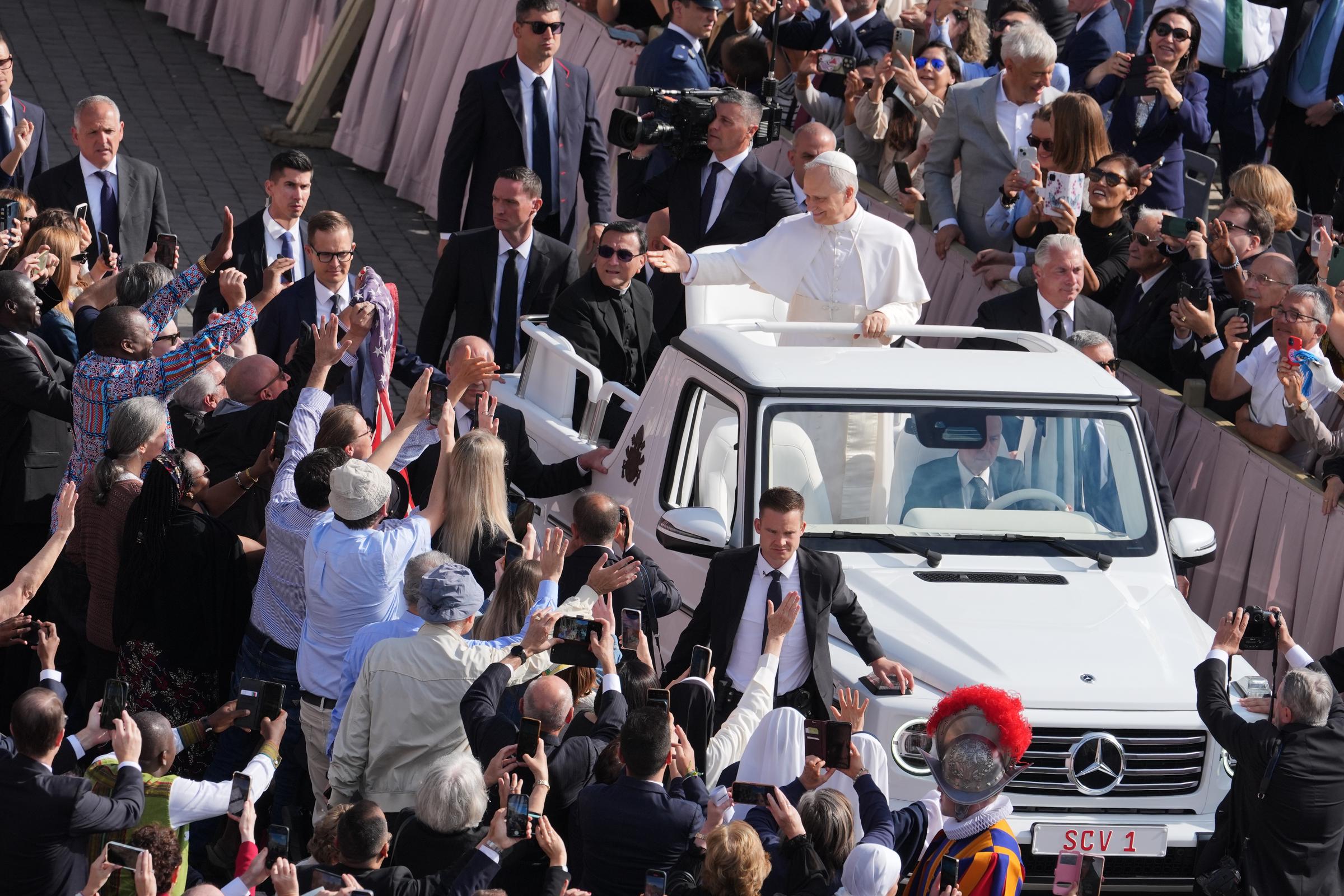
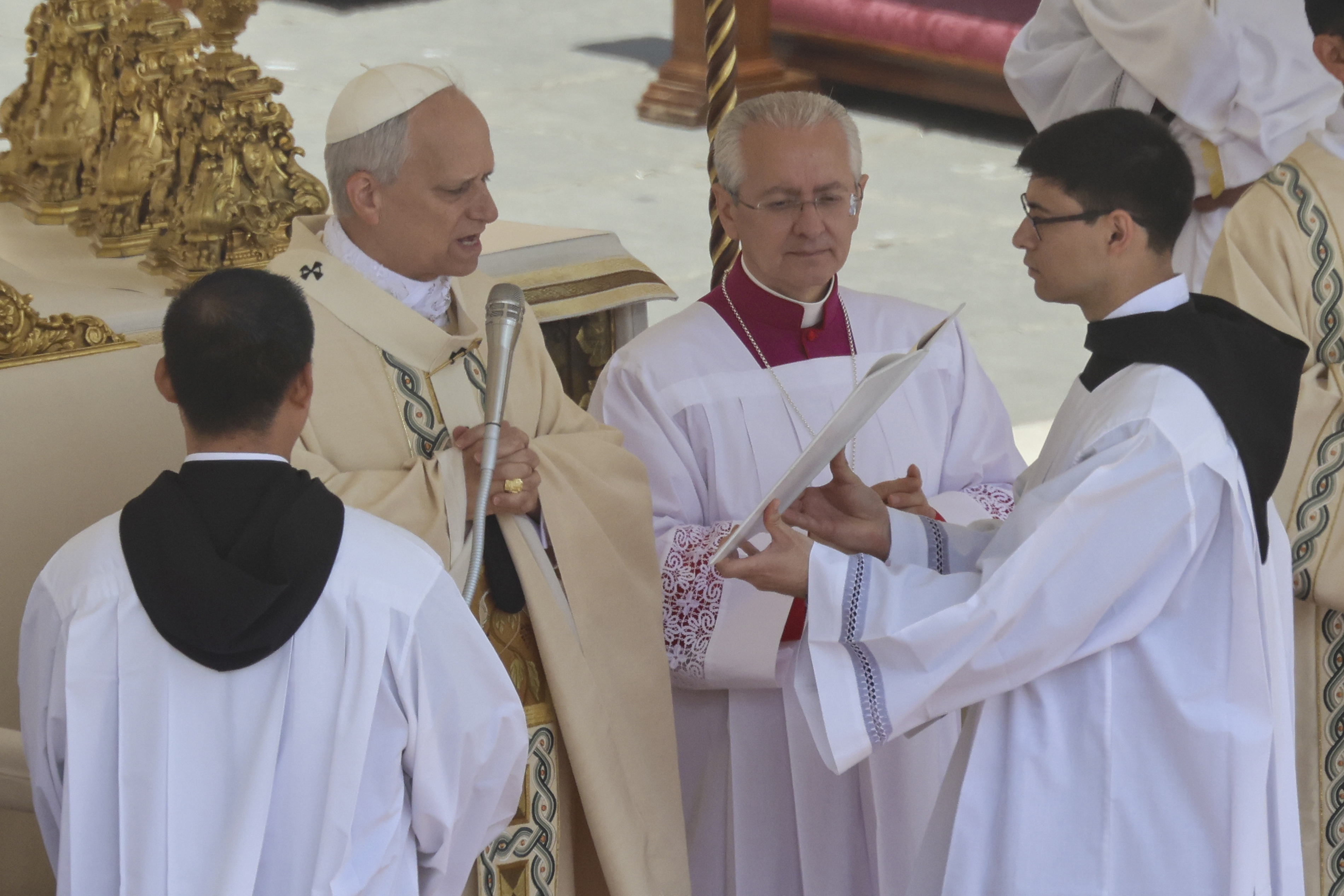
View this post on Instagram
Just days earlier, he had signaled a similar break from tradition. On May 9, at his first Mass in the Sistine Chapel, Pope Leo XIV addressed the College of Cardinals in English — a language hardly ever used as the opening language of a papal homily, particularly in such a formal setting.
Speaking in his Chicago accent, he began, “I will sing a new song to the Lord,” before continuing the Mass in Italian.
These gestures — the open vehicle and the use of English — reflected a conscious shift in tone. They were also a clear signal that Pope Leo XIV intended to lead in a voice distinctively his own.
One attendee who appeared to resonate with the Pope’s message was Zelenskyy, who joined the mass with his wife, Olena Zelenska. He later met with Pope Leo XIV and posted about the meeting on Instagram.
Zelenskyy thanked the Pope for the audience and wrote, “For millions of people around the world, the Pontiff is a symbol of hope for peace. The authority and voice of the Holy See can play an important role in bringing this war to an end.”
He continued, “We thank the Vatican for its willingness to serve as a platform for direct negotiations between Ukraine and Russia. We are ready for dialogue in any format for the sake of tangible results.” His message echoed themes raised in the Pope’s homily, where he mentioned unity seven times and urged for a reconciled world.
While these words resonated with global calls for unity, reactions in the United States exposed more complex undertones.
View this post on Instagram
View this post on Instagram
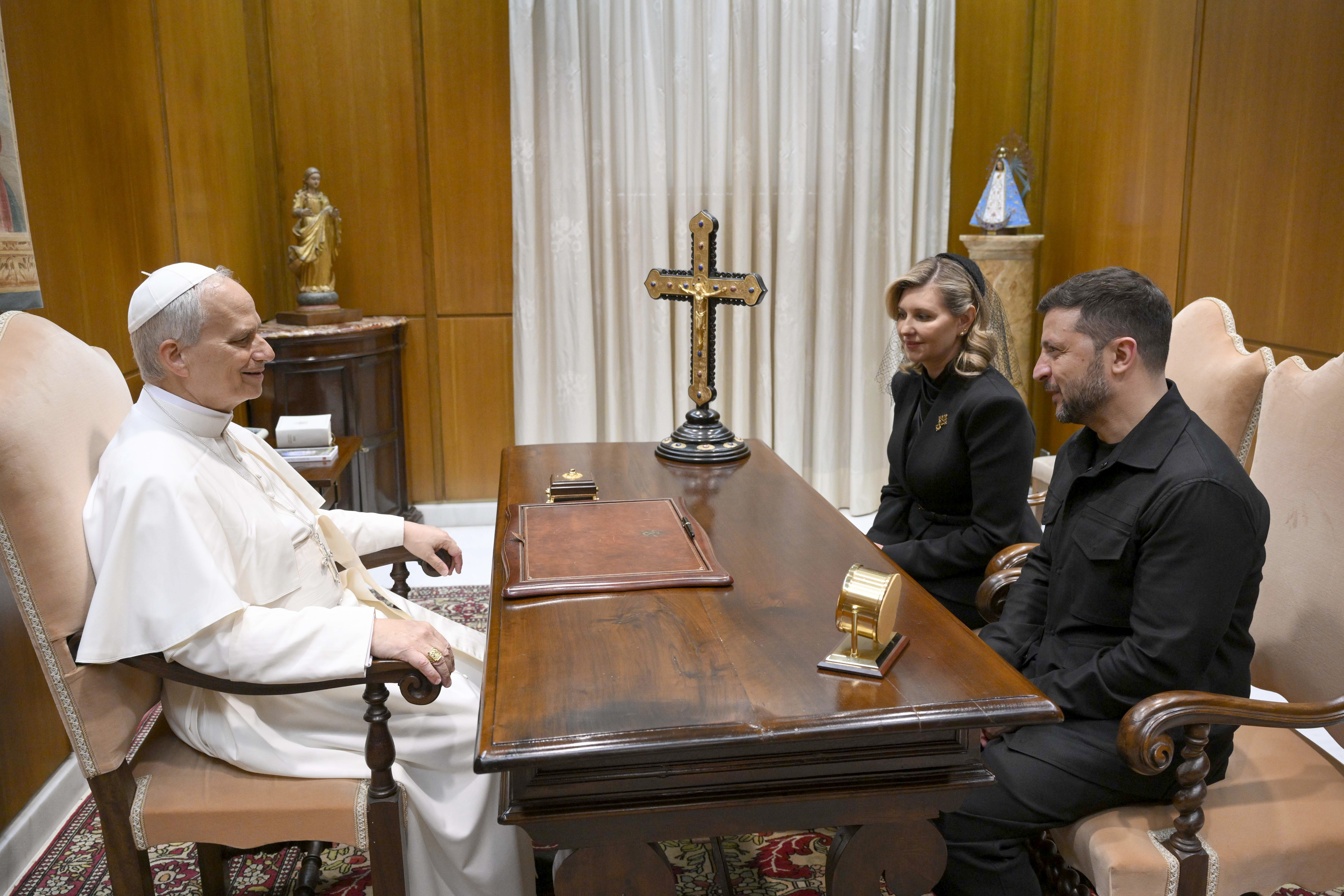
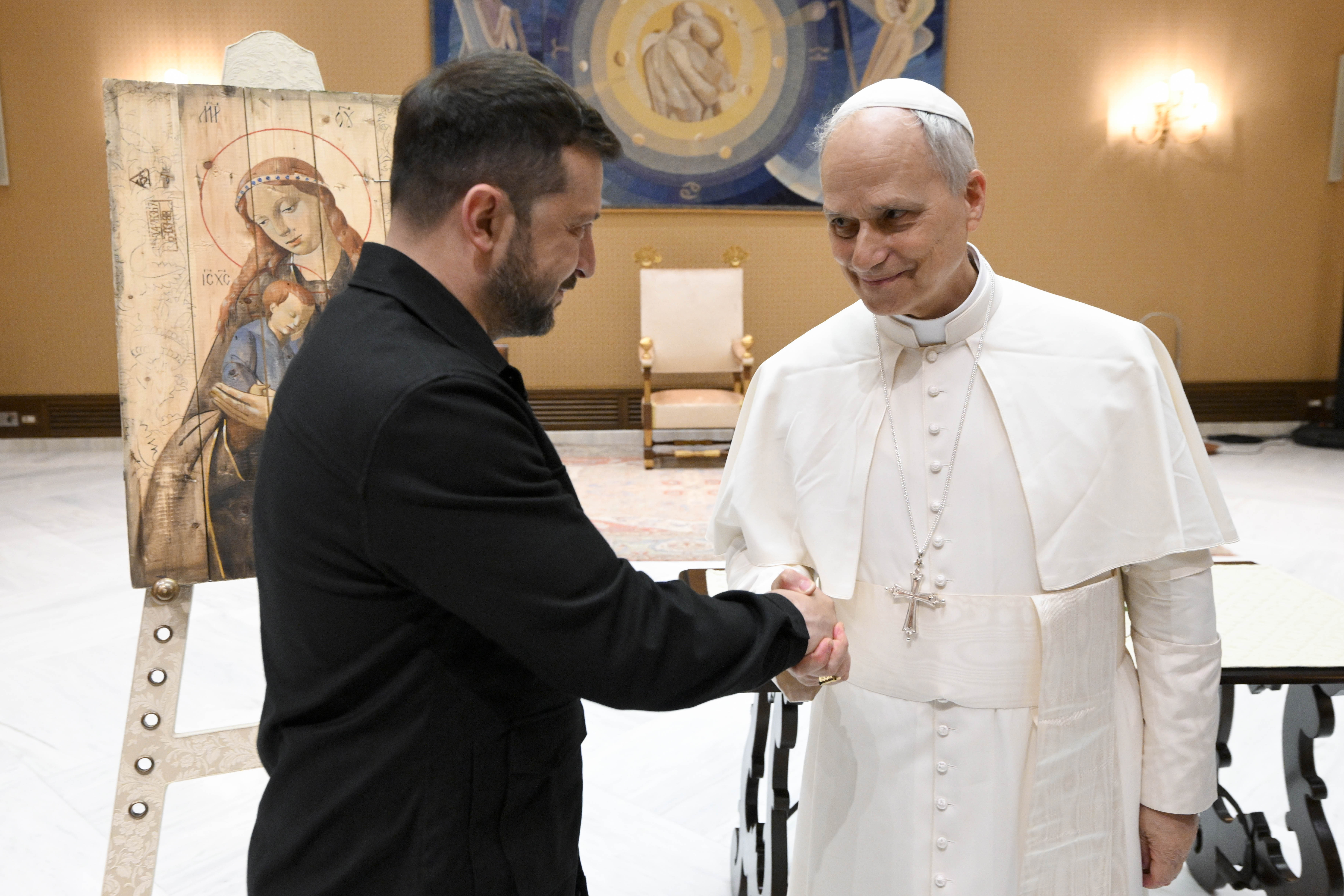
View this post on Instagram
A Complicated American Reception
Though Pope Leo XIV shares a birthplace with many of his critics, his early views and past commentary have drawn scrutiny from U.S. political figures.
Before his election, he shared a commentary on social media that criticized Vance’s interpretation of Christian values, particularly the notion of prioritizing certain groups over others in expressions of love or compassion.
This resurfaced after his election and drew sharp reactions. Steve Bannon, Trump’s former strategist, said, “It is shocking to me that a guy could be selected to be the Pope that had had the Twitter feed and the statements he’s had against American senior politicians.”
Though the Pope has not publicly outlined any political alignment, his past support for immigrants and his apparent respect for the late Pope Francis’s leadership have placed him at odds with many on the U.S. political right. Bannon predicted there was “definitely going to be friction” between Pope Leo XIV and Trump.
Amid those reactions, diplomatic engagement has begun. On May 19, Vance and Secretary of State Marco Rubio met with Pope Leo XIV to discuss areas of mutual concern, including conflict resolution and peacebuilding.
According to his brother, John Prevost, Pope Leo XIV holds moderate views but won’t hesitate to speak out when moved by conviction.
He said, “I don’t think he’ll stay quiet for too long if he has something to say. I know he’s not happy with what’s going on with immigration. I know that for a fact. How far he’ll go with it is only one’s guess, but he won’t just sit back. I don’t think he’ll be the silent one.”
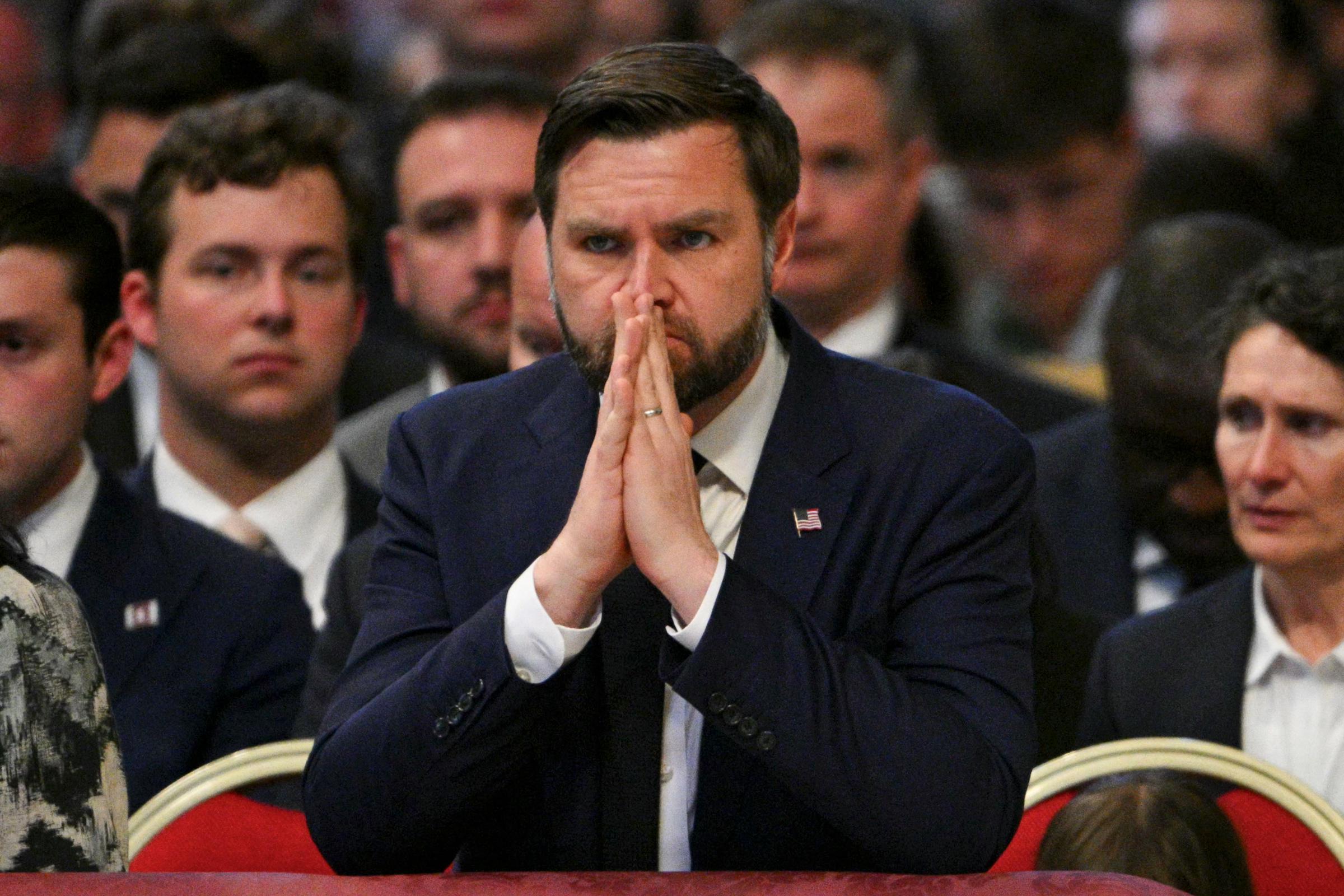
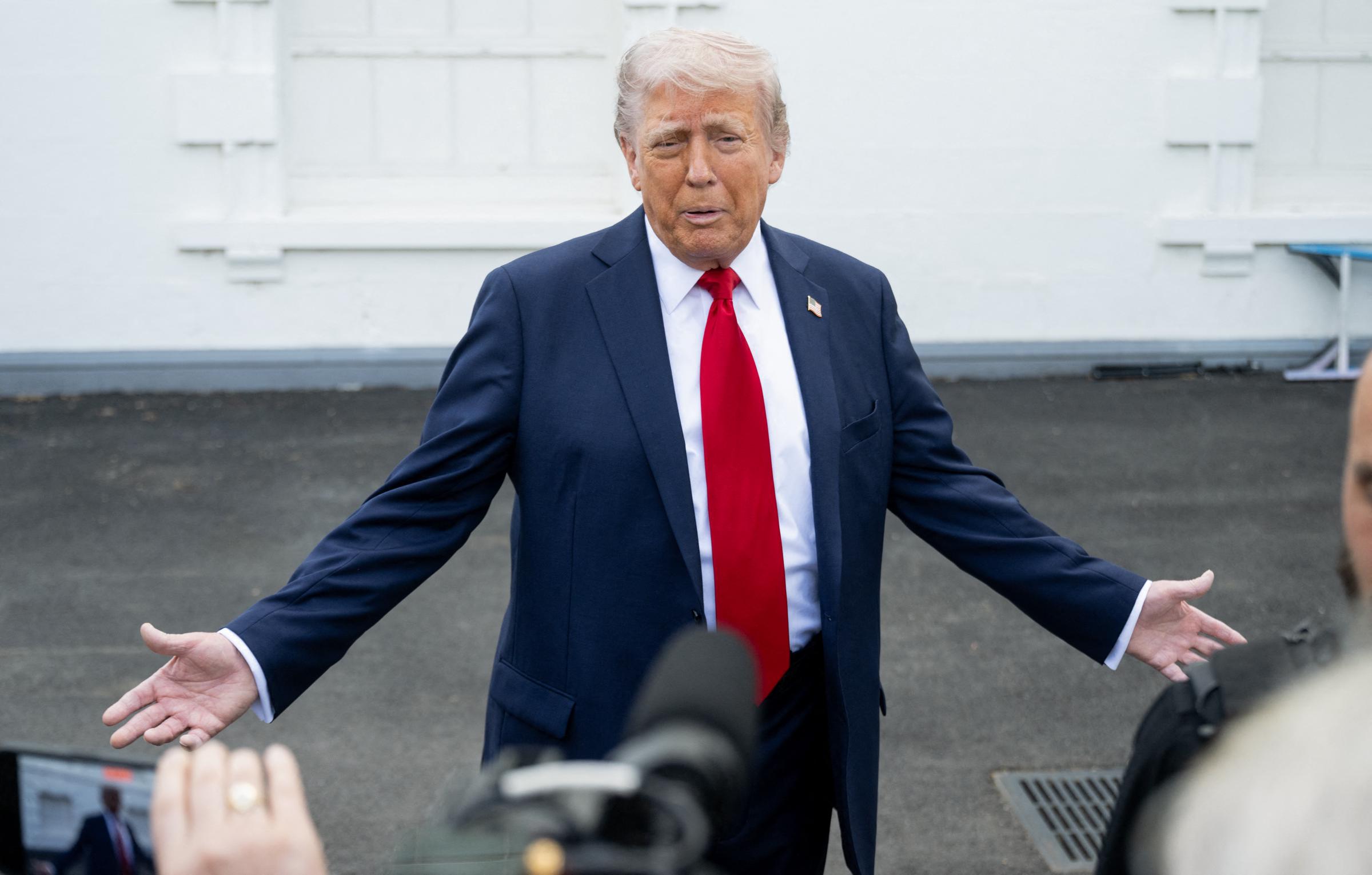
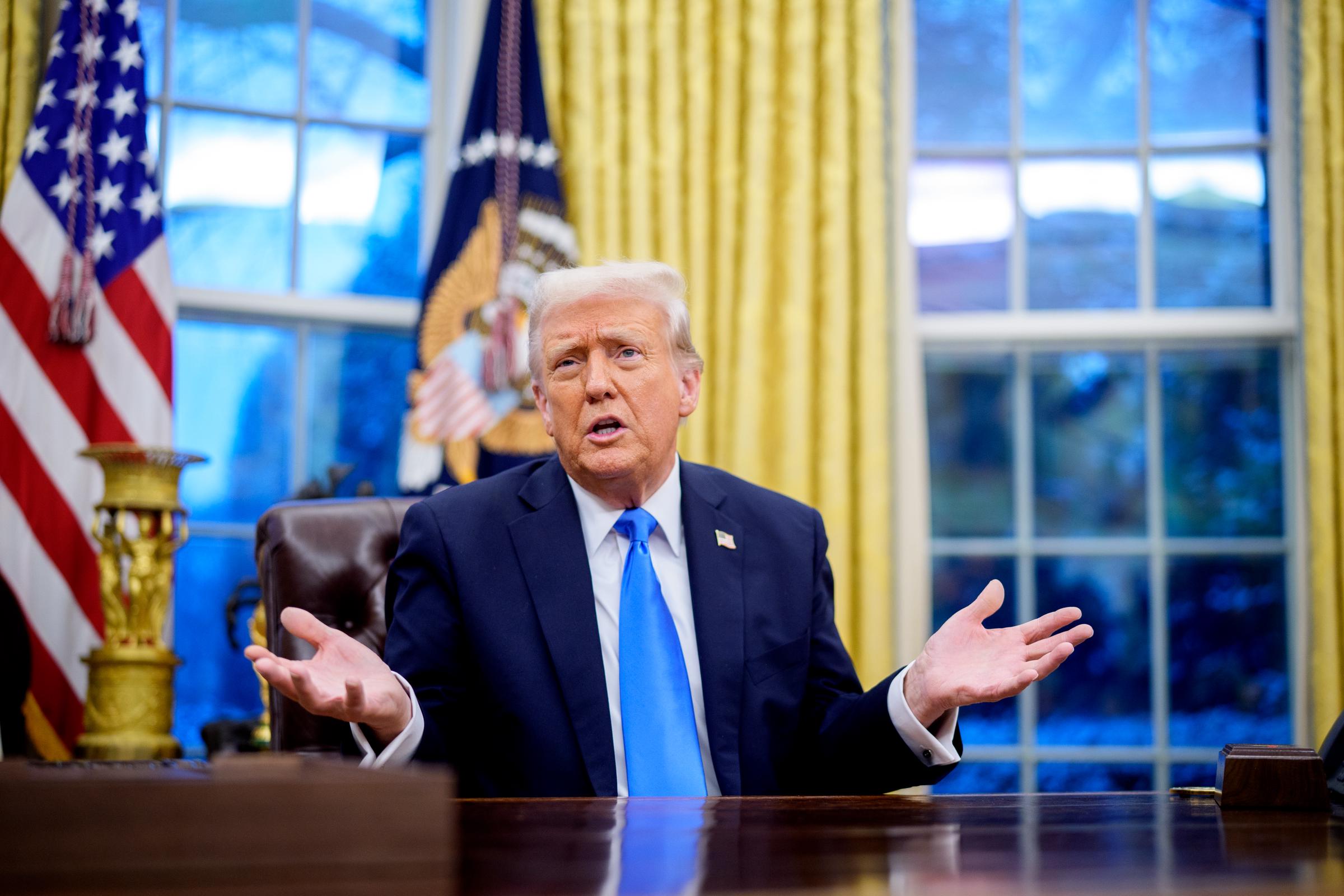
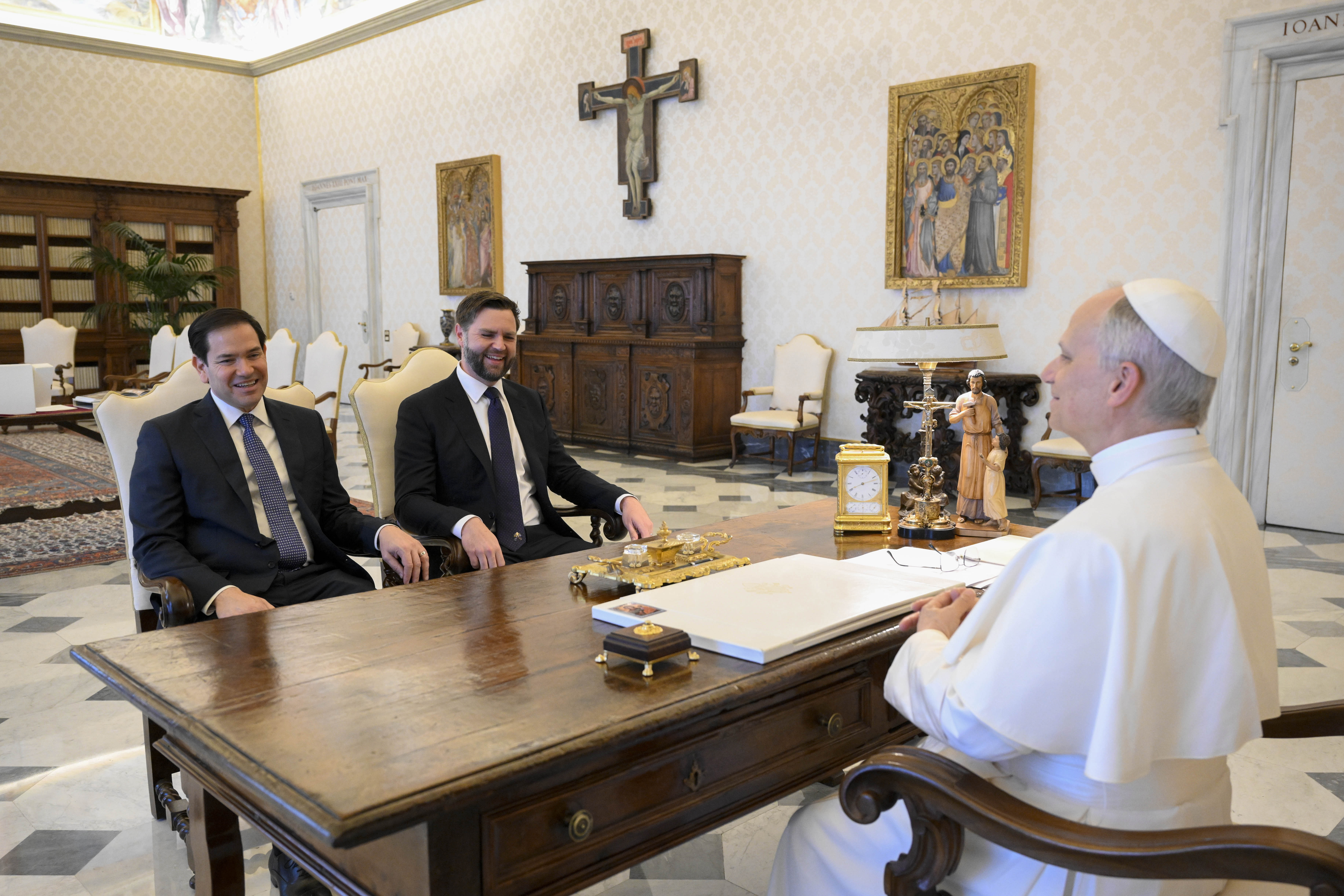
View this post on Instagram
While Pope Leo XIV broke protocol in his own way, some traditions, like how royal women dress to meet the pope, are quietly evolving too.
How the Dress Code for Royal Women Meeting the Pope Changed
When the current Queen Consort, Camilla, was still the Duchess of Cornwall, she met Pope Benedict XVI in 2009. During that meeting, she wore the customary black dress with long sleeves and a lace mantilla, or veil.
This dress code had been observed by women for centuries when meeting His Holiness. However, in April 2017, when Camilla met the now-late Pope Francis, she chose a pale gold dress and coat by Anna Valentine.
The Queen Consort opted not to wear headwear, seemingly defying the Vatican’s dress code. However, her look was not an issue, as Pope Francis welcomed the change. A Vatican spokesperson once explained, “Things have become more relaxed over the last few years [sic] there are no hard and fast rules.”
Since Camilla’s husband, King Charles III, is the head of the Anglican Church, she was required to wear black instead of white during her audience with the pope. When she met Pope Francis two weeks before his death during her royal tour of Italy, she wore a black dress with cropped sleeves and a knee-length skirt.
The meeting marked her first papal audience since her husband’s accession in September 2022. She respected a nuanced rule, as she does not have permission to wear white for such meetings.
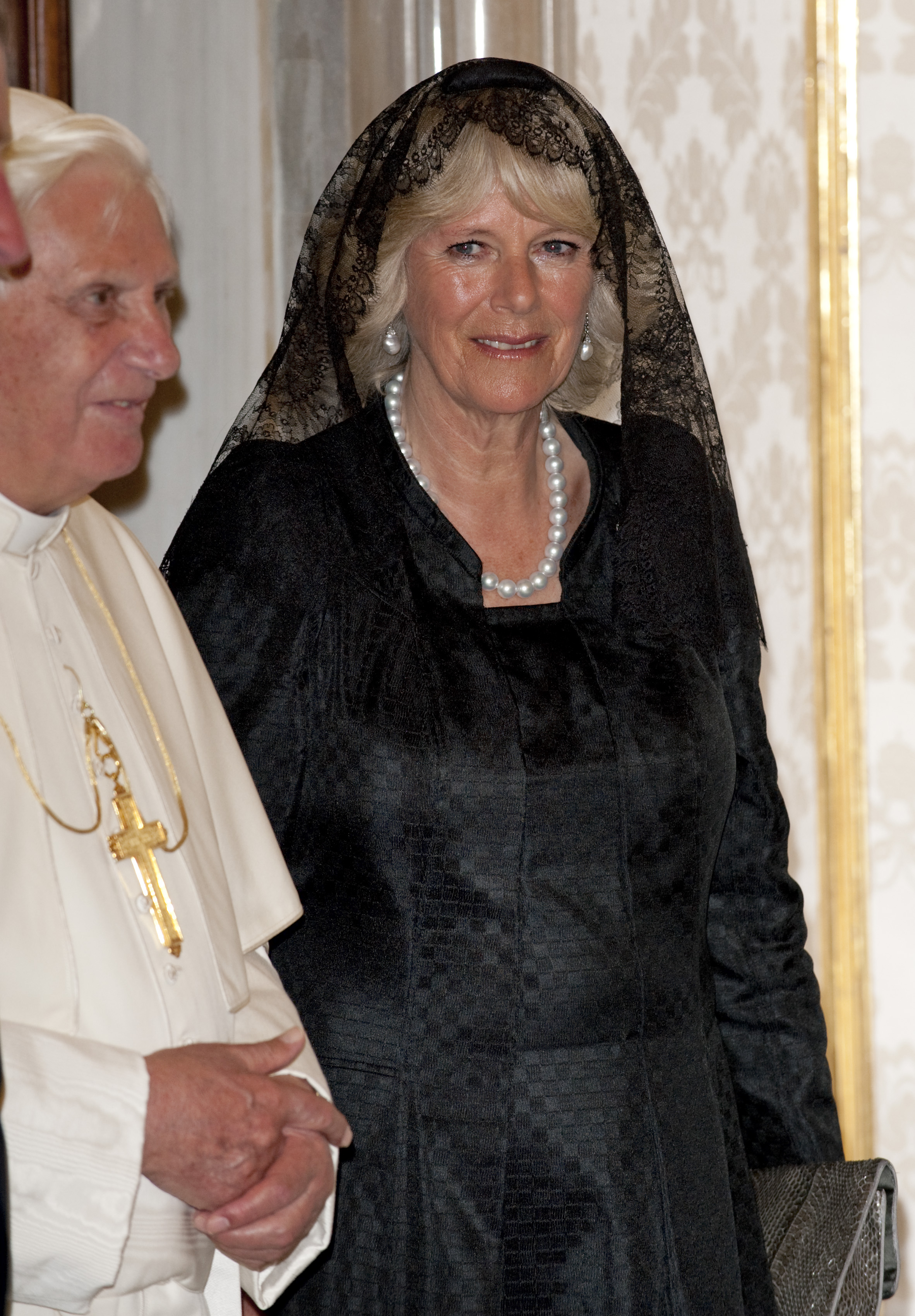
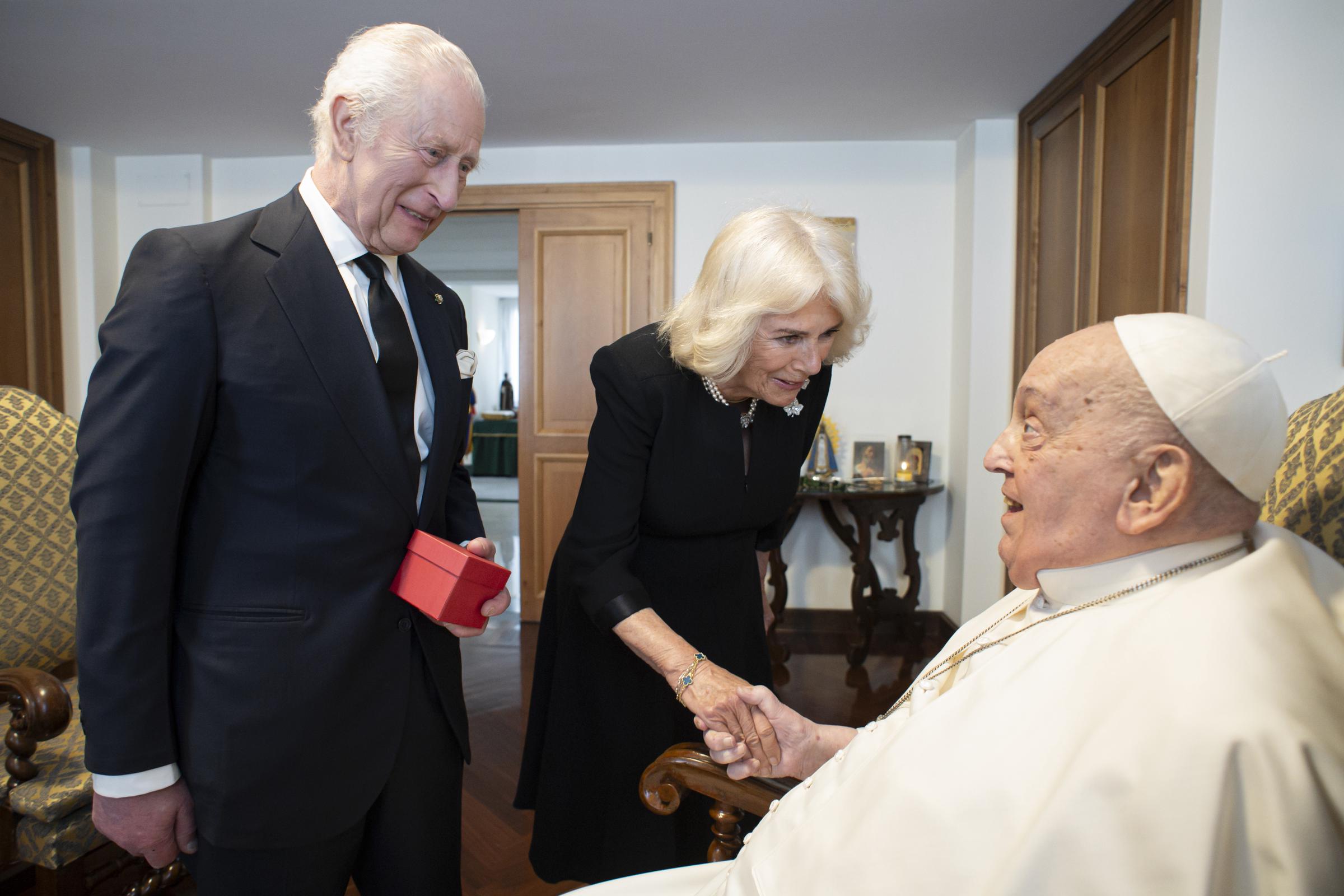
When the now-late Queen Elizabeth met with the pope, she always wore black. However, since Francis became pope, Elizabeth had chosen to stick to her signature colorful style when meeting him. For instance, in 2014, she wore a lilac suit with a matching hat.
While wearing colors may now be acceptable, wearing white is reserved for a few. So when, in 2006, Cherie Blair did exactly that when she met Pope Benedict XVI, subsequent headlines mocked her, stating that she had a “grand idea of herself.”
In the past, white dresses were only permitted for a few Catholic queens and princesses. When Princess Charlene of Monaco met Pope Francis in January 2016, she adhered to the “privilège du blanc” in French or “il privilegio del bianco” in Italian, meaning “privilege of the white.”
She wore a white jacket, matching driving gloves, a mantilla, and nude heels. The only color she added to her ensemble was her red lipstick.
Besides Charlene, only six other queens and senior female royals worldwide officially qualify for the “privilège du blanc” dress code. They include Queen Letizia of Spain, Queen Sofia of Spain, Belgium’s Queen Mathilde and Queen Paola, Grand Duchess María Teresa of Luxembourg, and Princess Marina of Naples.
Protocol states that those with permission may wear white for papal events like private audiences, canonizations, beatifications, and special masses.
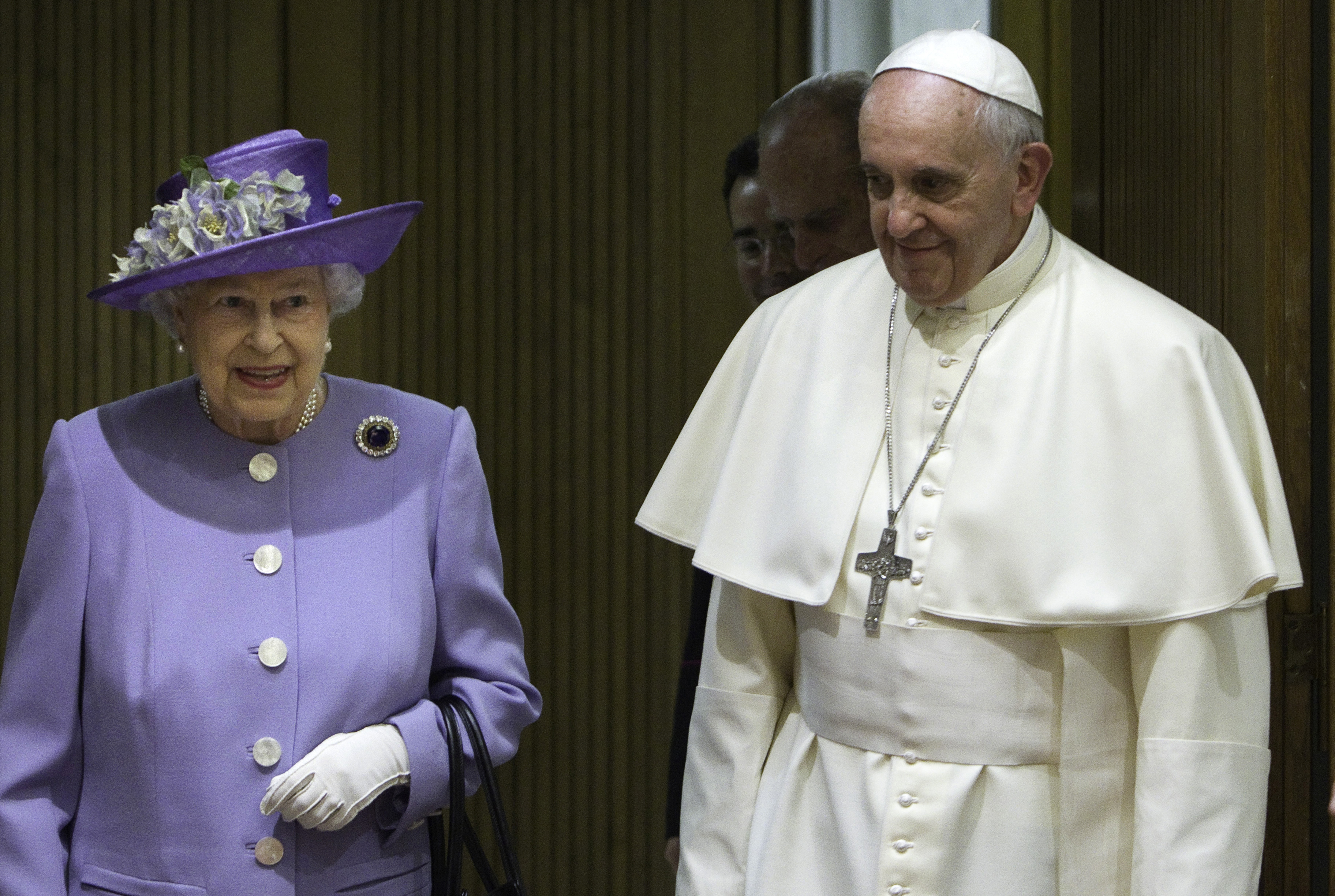
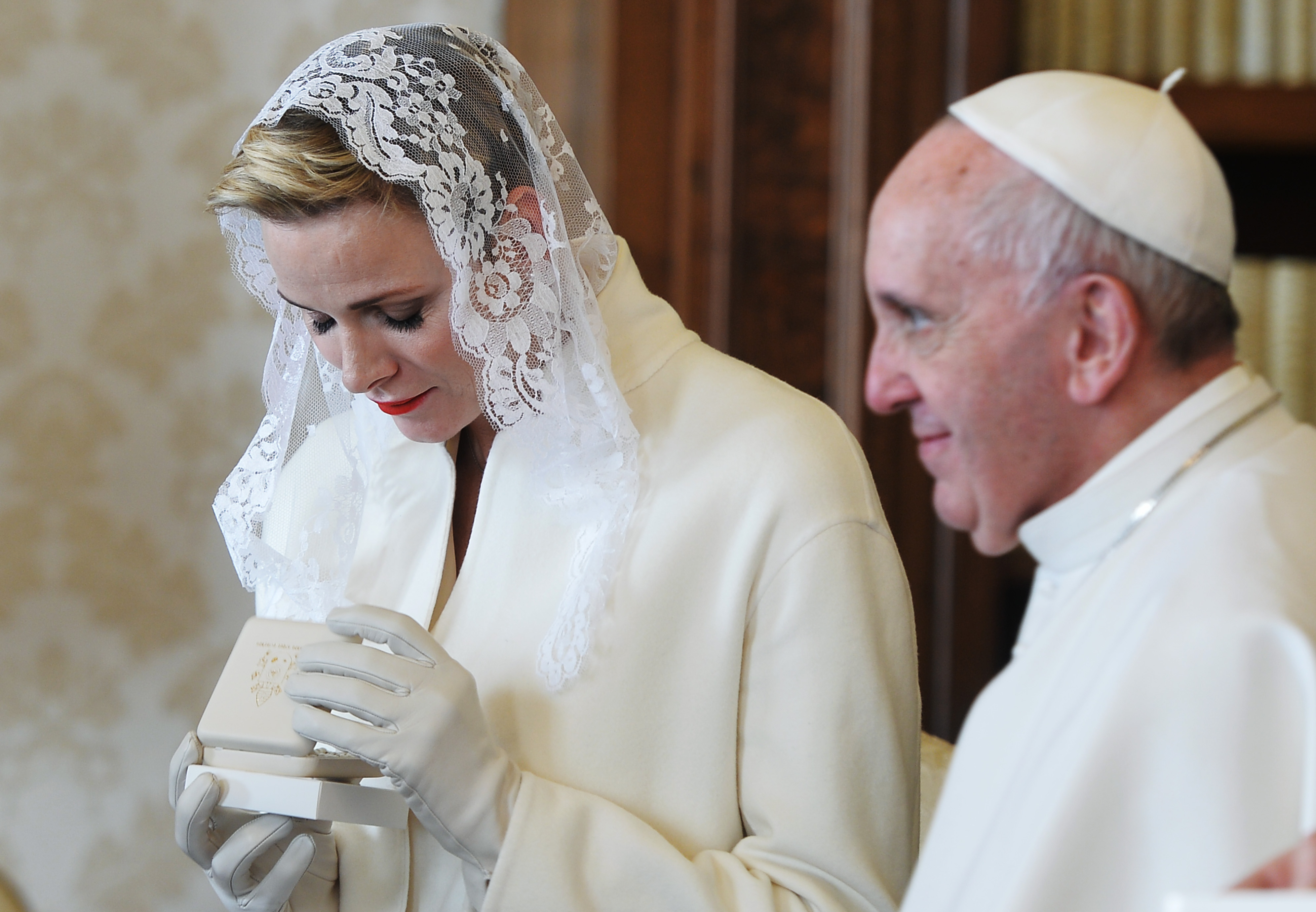
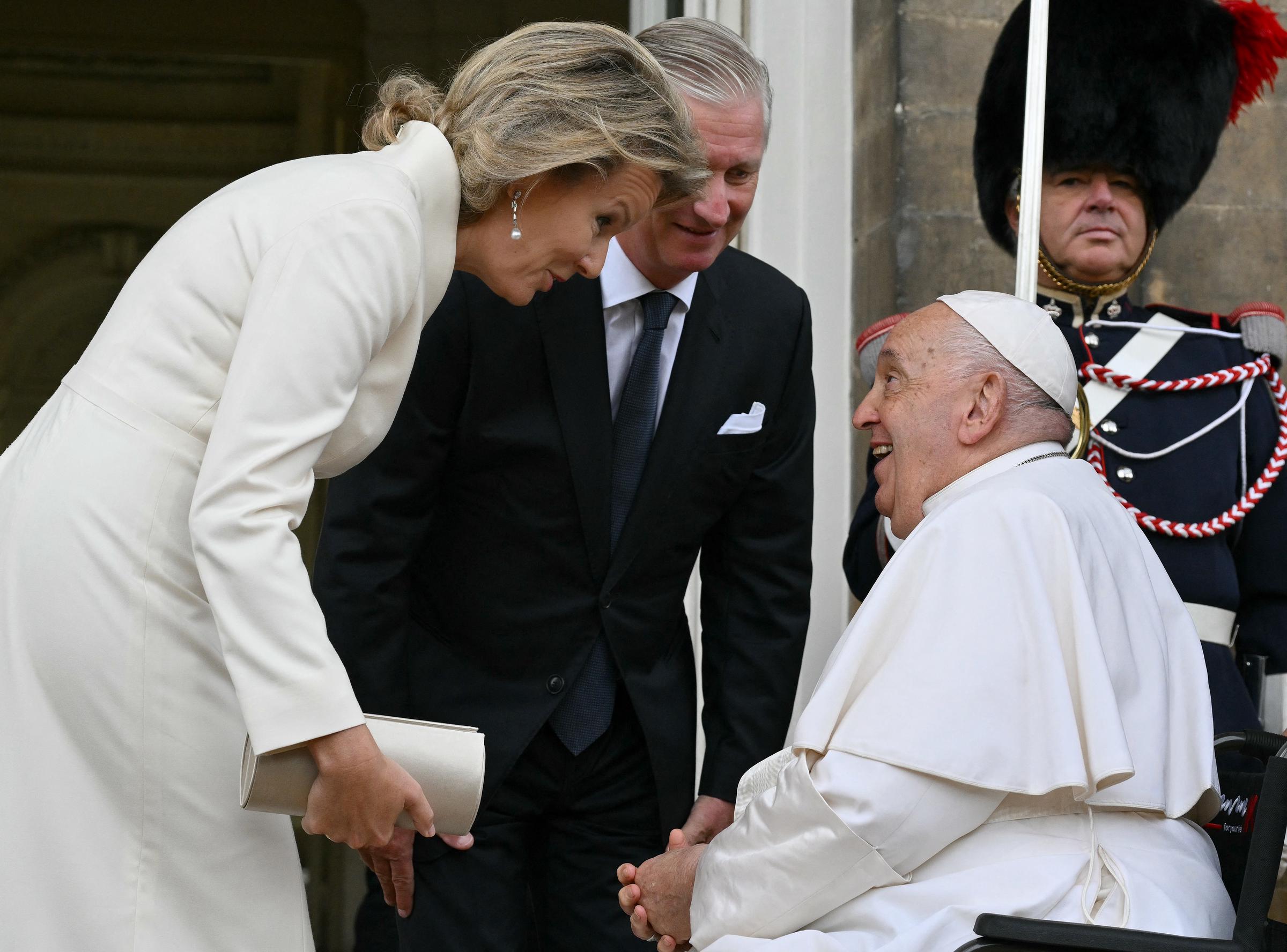
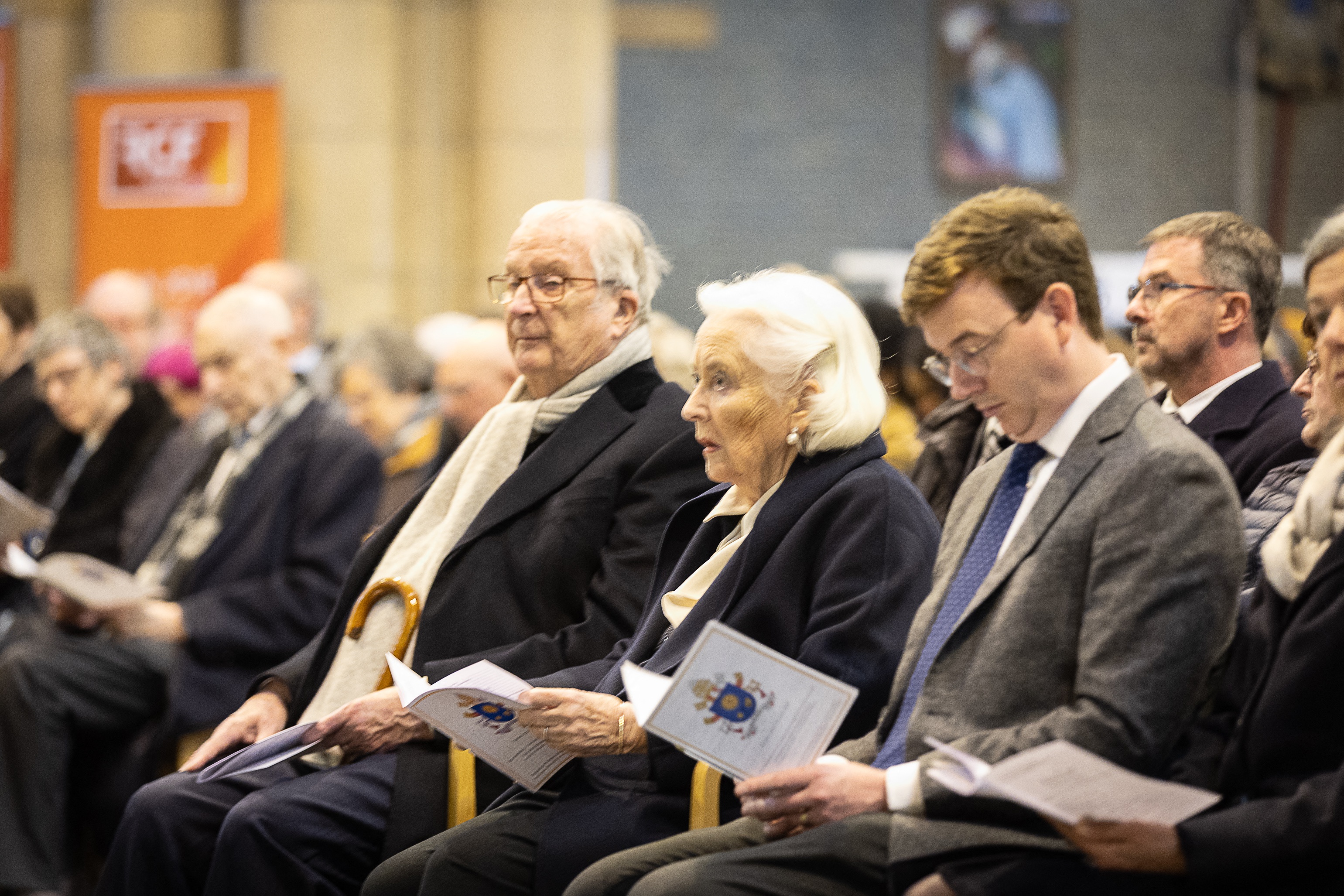
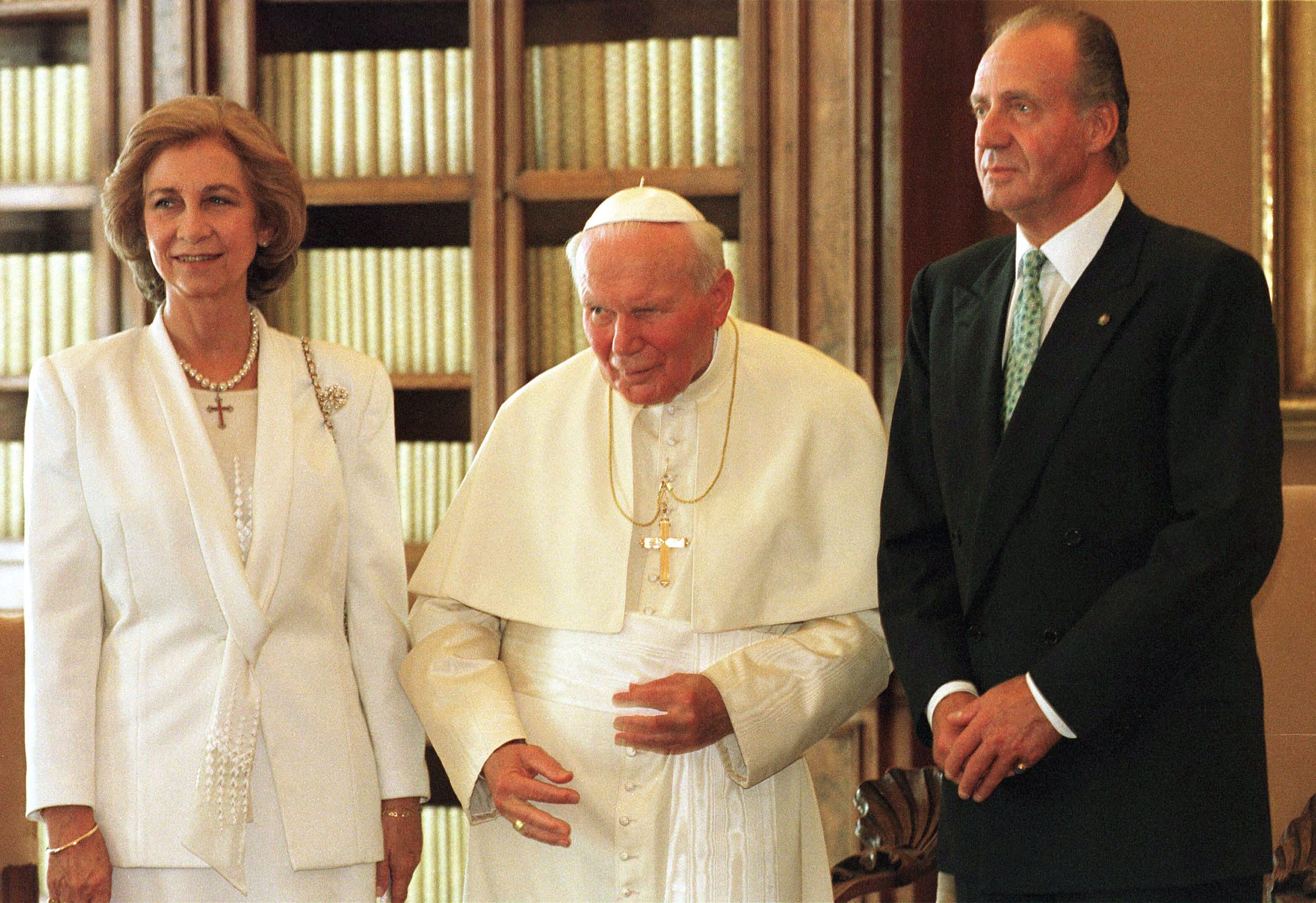
Why Some Royals Wore Veils for Pope Francis’ Funeral
On April 26, 2025, Pope Francis’ funeral was held at St. Peter’s Square in Rome following his death on April 21, Easter Monday. Many people came to pay their respects, including royals like Princess Charlene of Monaco, Queen Letizia of Spain, and Queen Rania of Jordan.
The trio wore black outfits and veils at the late pontiff’s service. Queen Letizia wore a black dress with a round neckline and three-quarter-length sleeves. The 50-year-old royal also wore a black veil and a pair of matching heels.
Letizia carried a black handbag while walking with her husband, who matched her look with a black suit. Women are reportedly obligated to wear a veil when meeting the pope, regardless of the occasion.
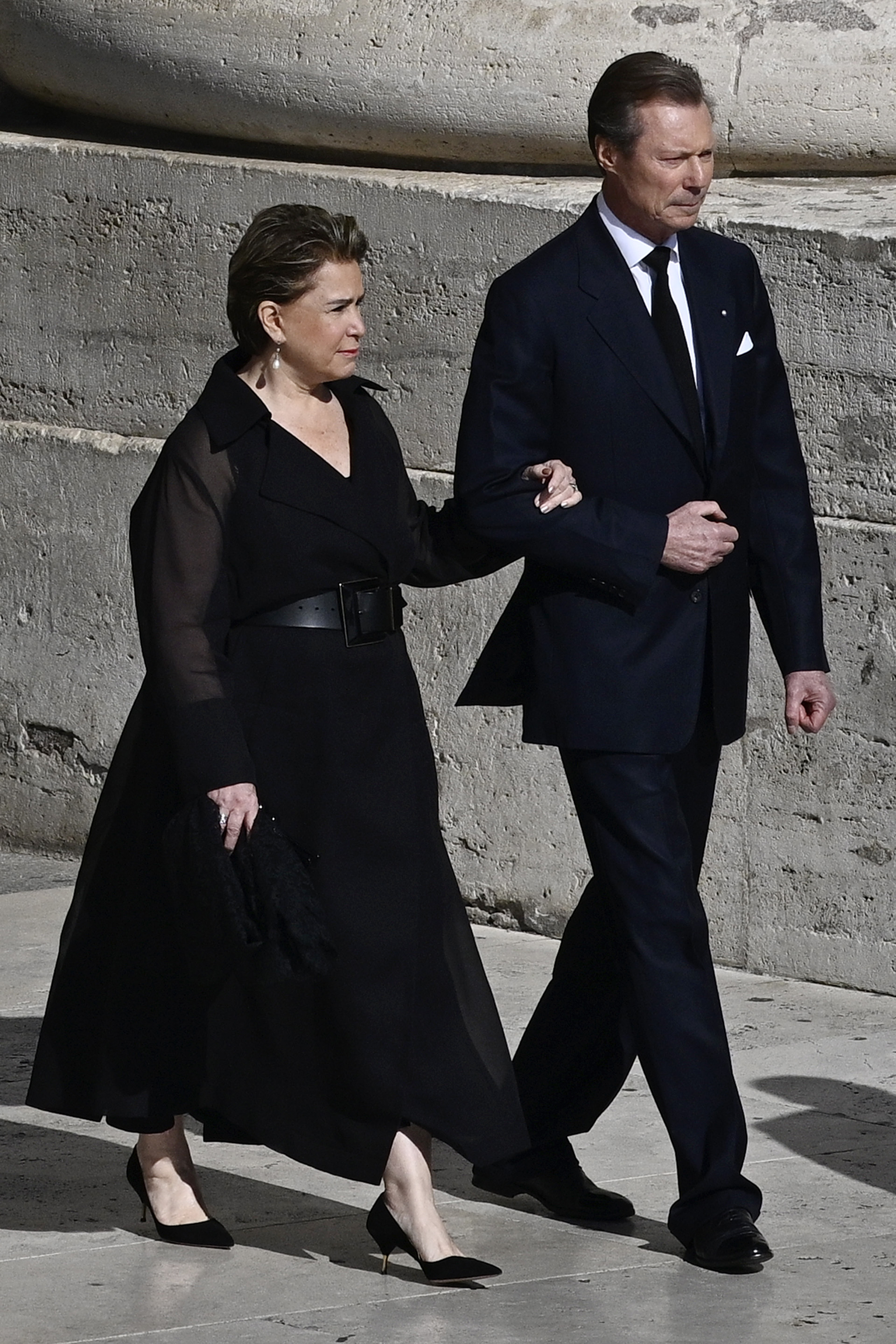
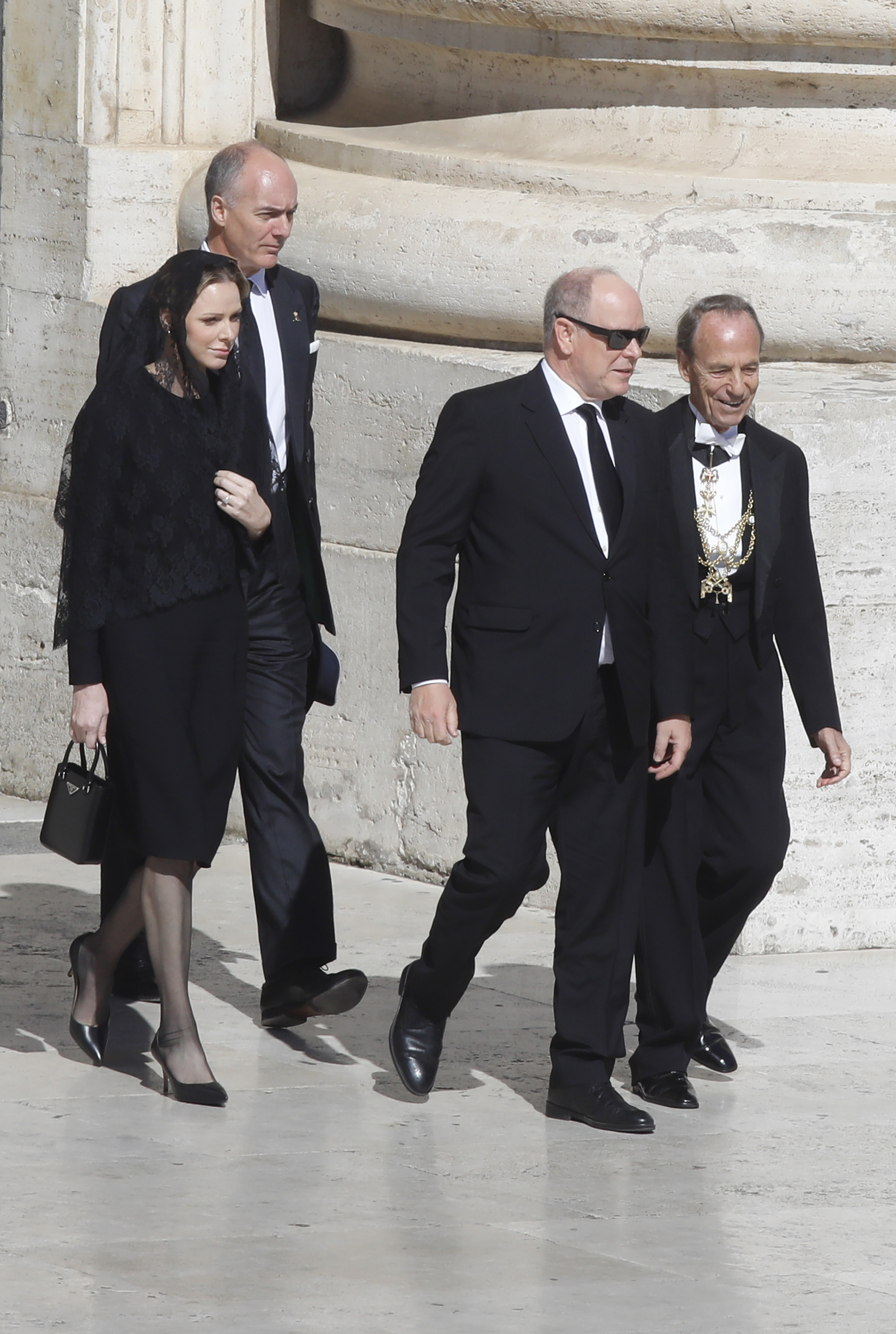
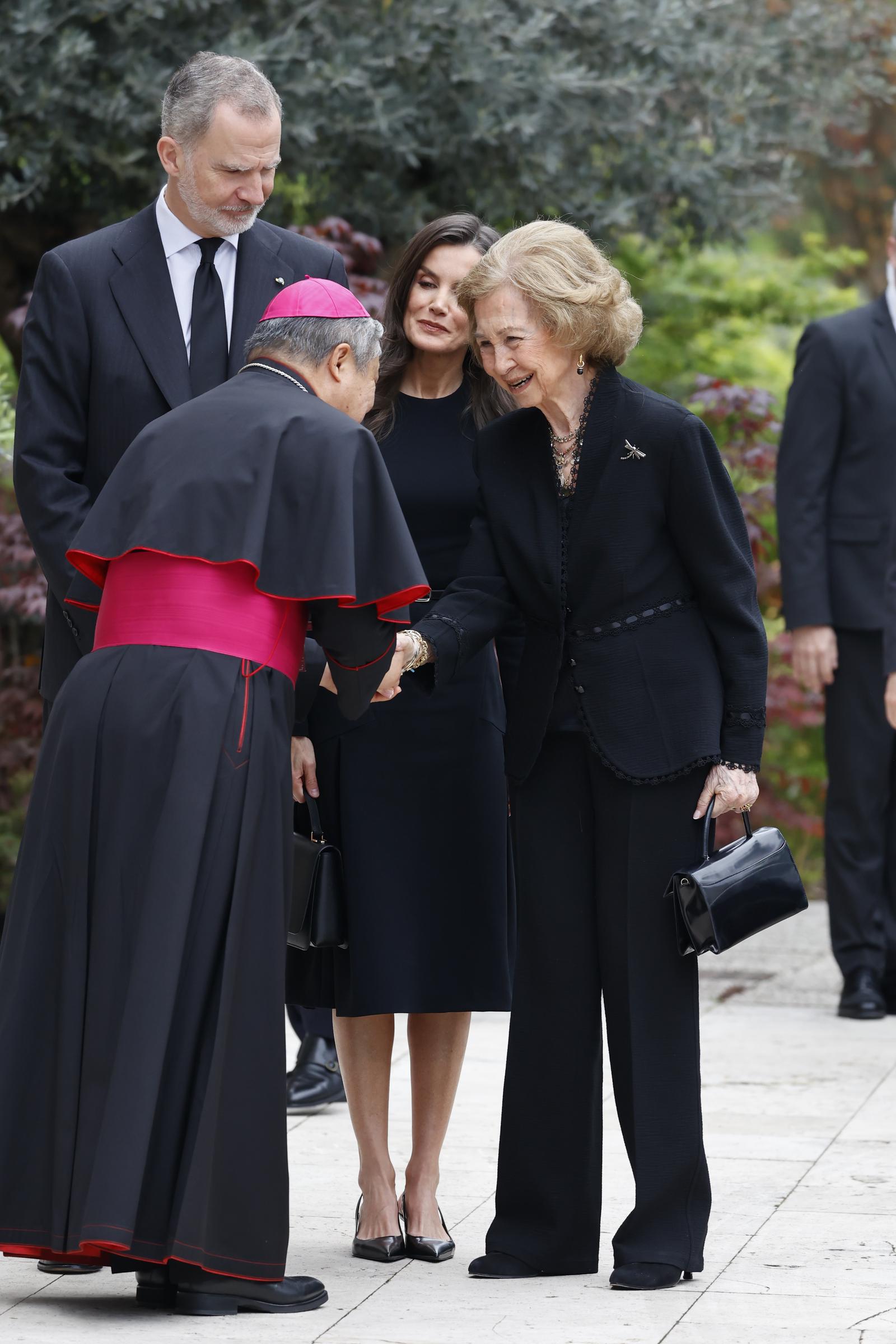
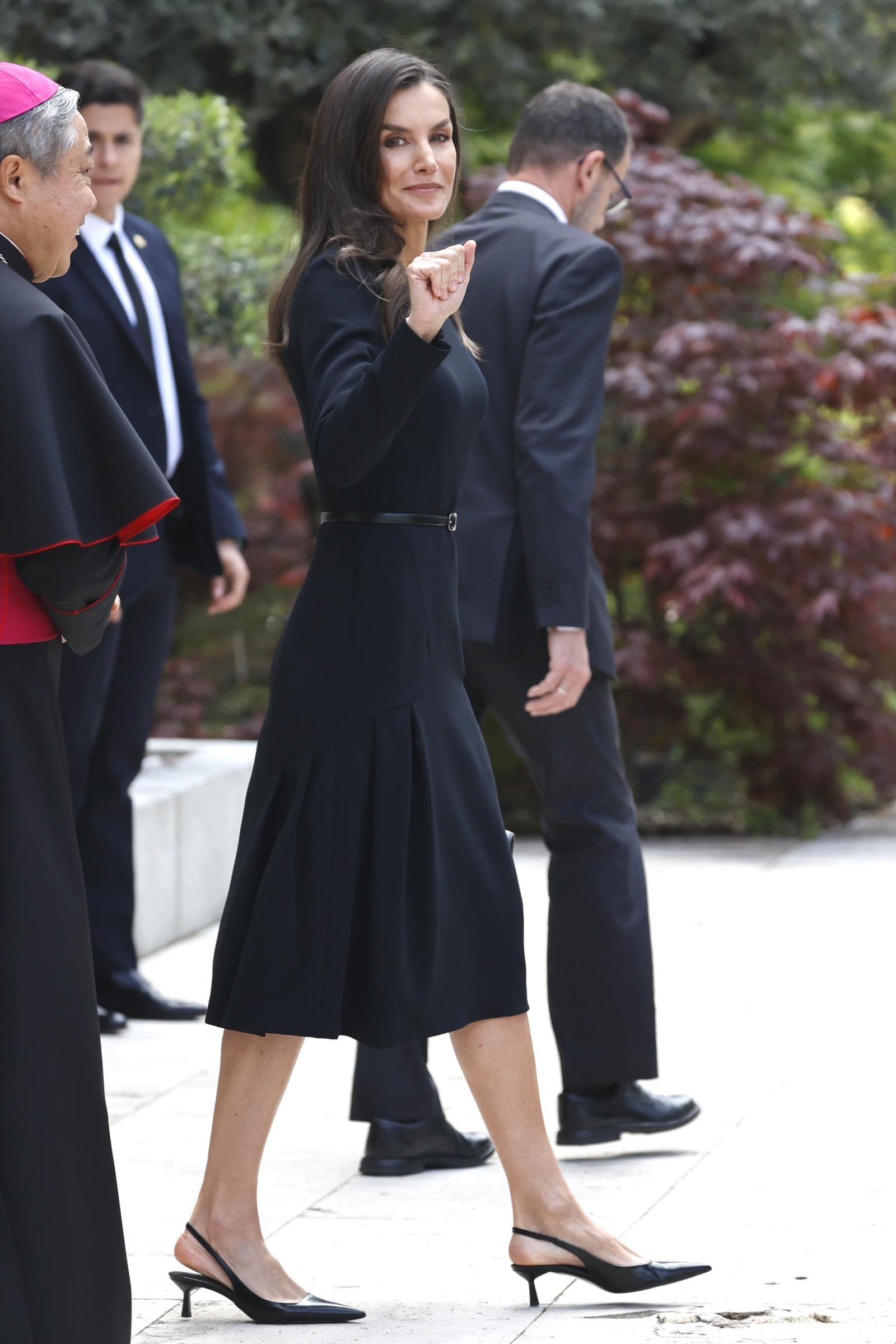
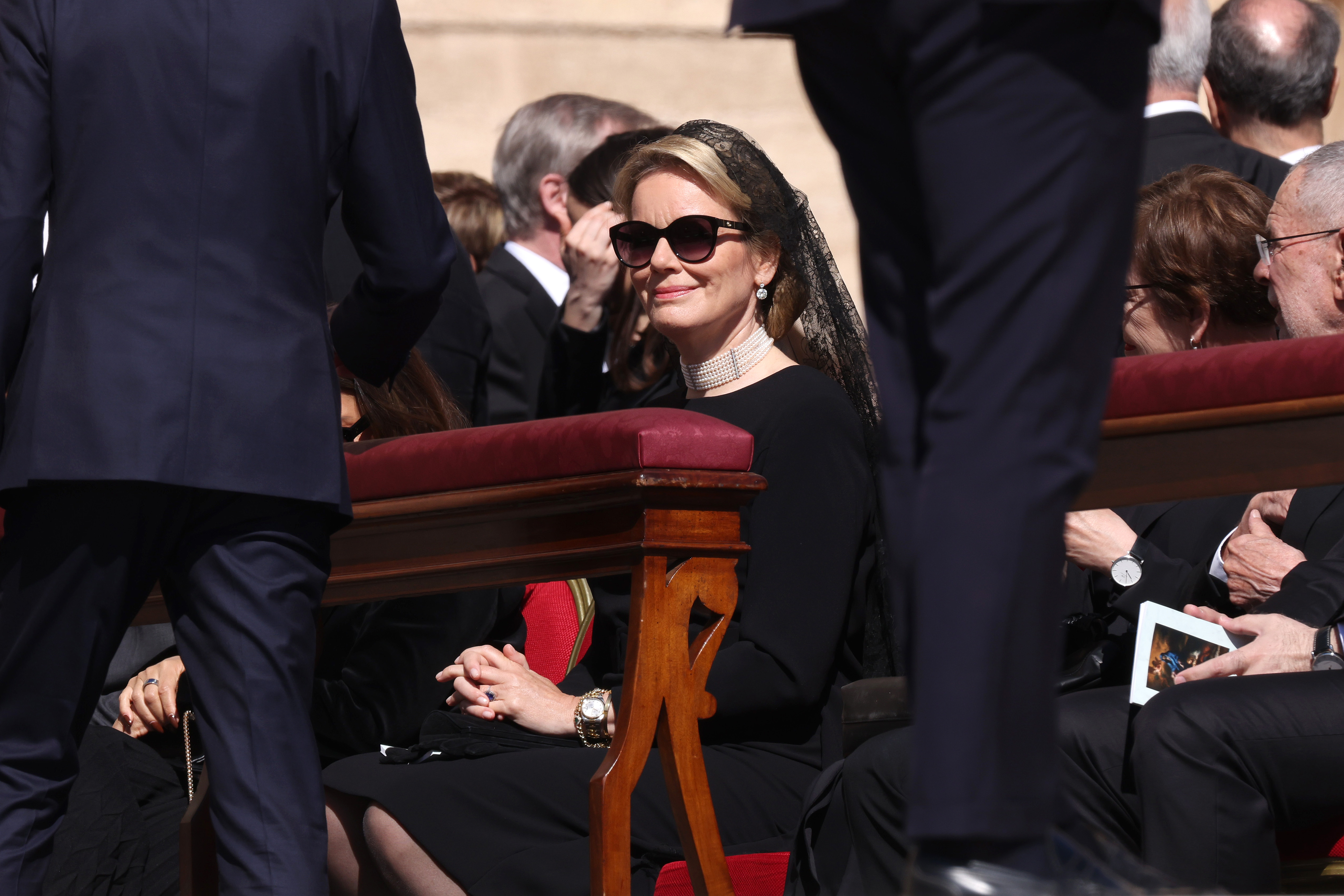
The long-standing Catholic Church tradition symbolizes humility and respect. Women are expected to wear a modest black dress with a low hem, long sleeves, and minimal jewelry. The mourning veil is generally made from tulle, lace, or fine netting material that is see-through.
Danielle Stacey, a royal correspondent, explained, “Dressing head-to-toe in black is typically reserved for funerals and remembrance. Coincidentally, a black outfit is an essential item when all royals travel overseas so that they are appropriately dressed in the event of a family death when they are abroad.”
However, wearing a white veil at the pope’s funeral is forbidden.
While attending the 88-year-old pope’s funeral at St. Peter’s Basilica, royals like Queen Letizia followed the Vatican dress protocol, which states that attendees must wear black or dark colors.
Women are expected to wear long or knee-length dresses with long sleeves, while adornments should be avoided as a sign of deep respect. Jewelry should also not be flashy or ostentatious.
However, jewelry like pearls is a respectful choice, as seen when Queen Sofía wore them at Pope John Paul II’s funeral on April 8, 2005. The choice of footwear is also crucial, with low heels being preferred. Shoes should be minimalist and closed.
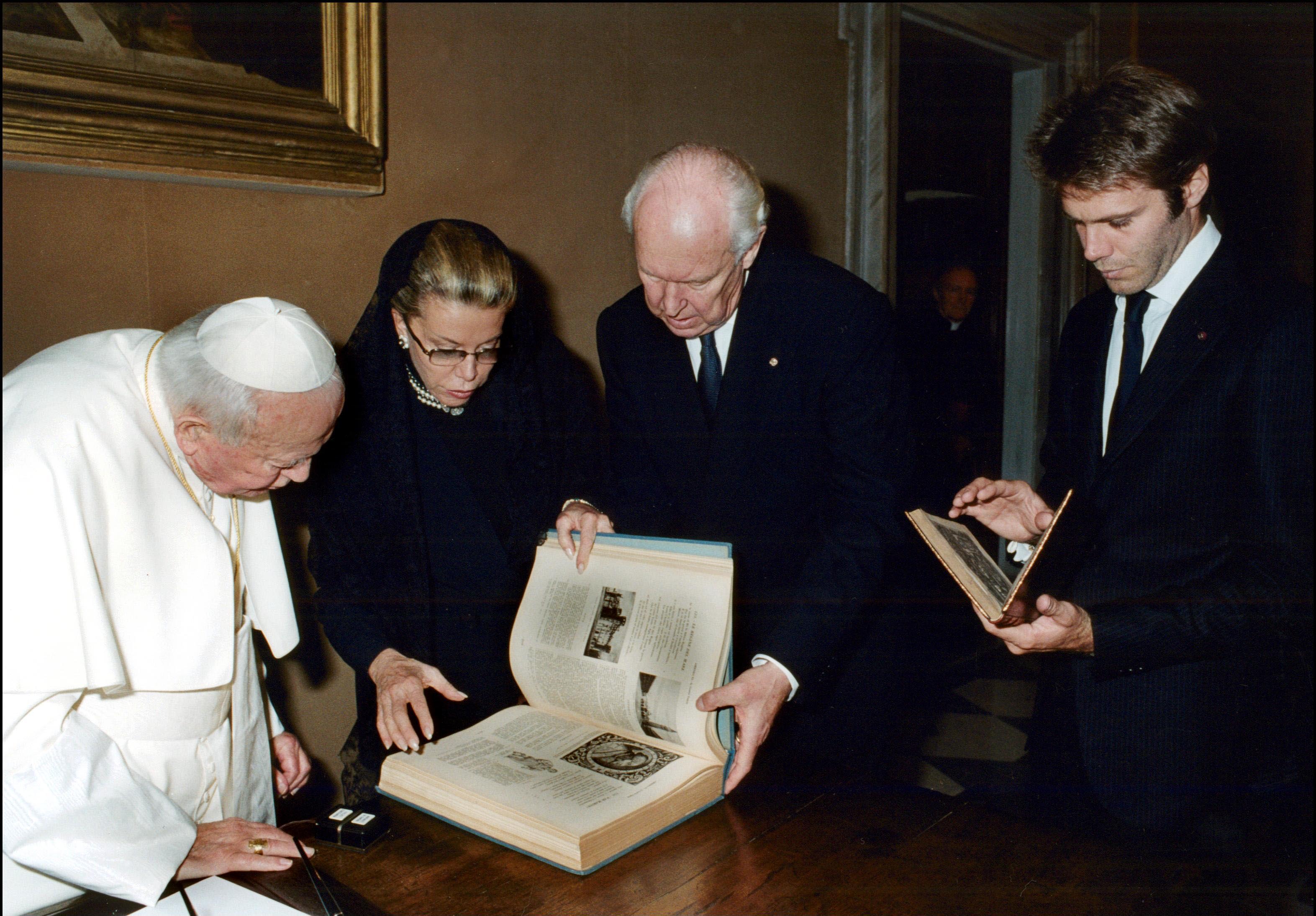
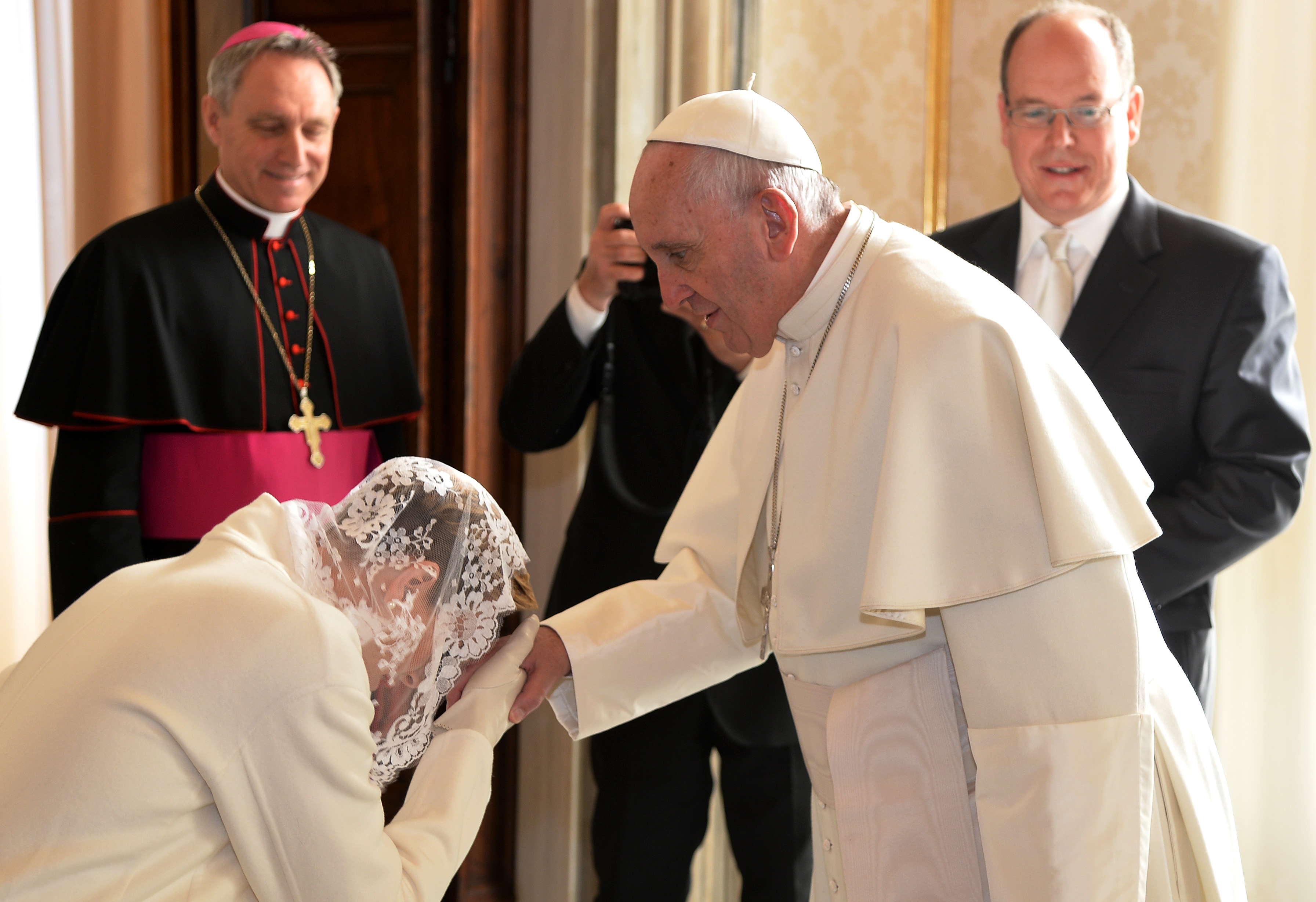
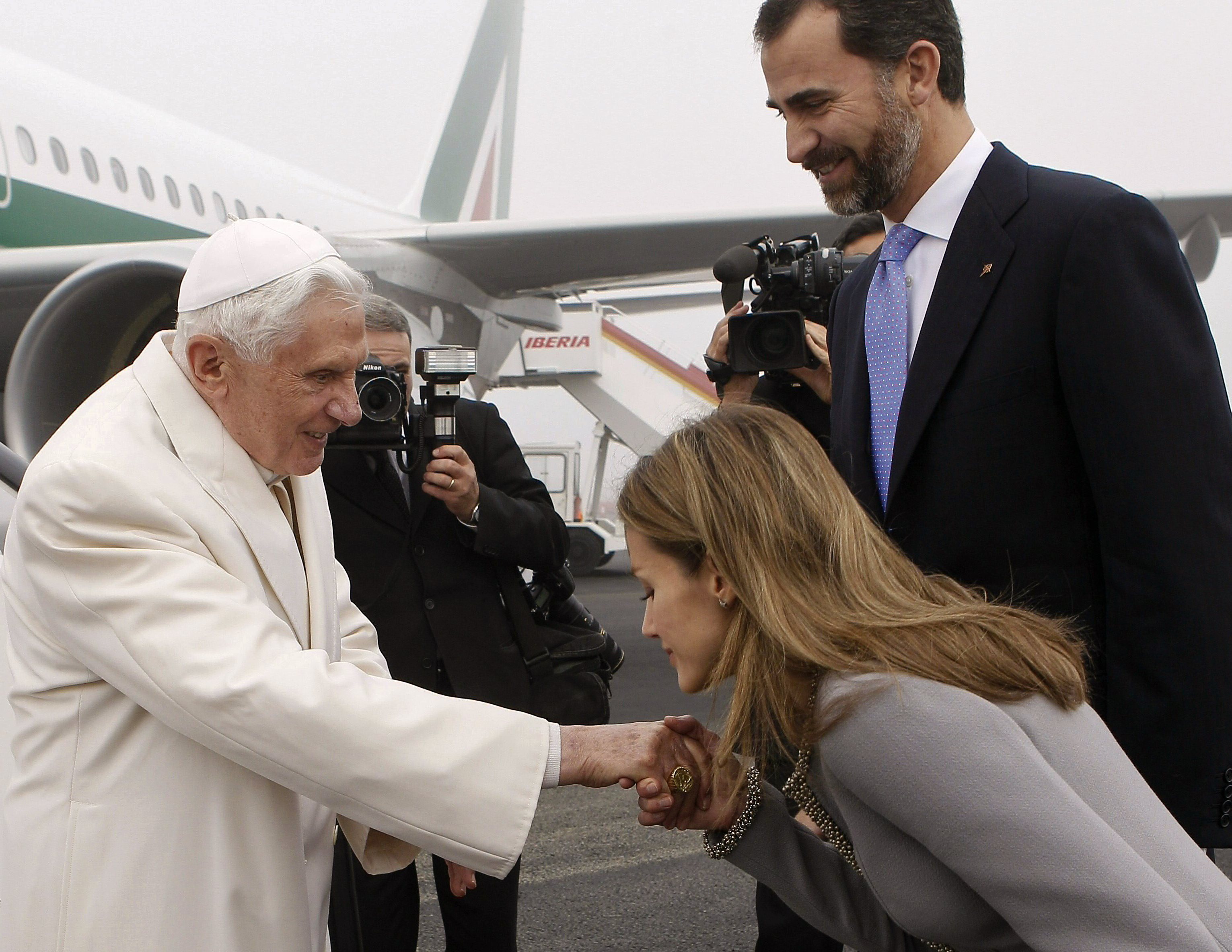
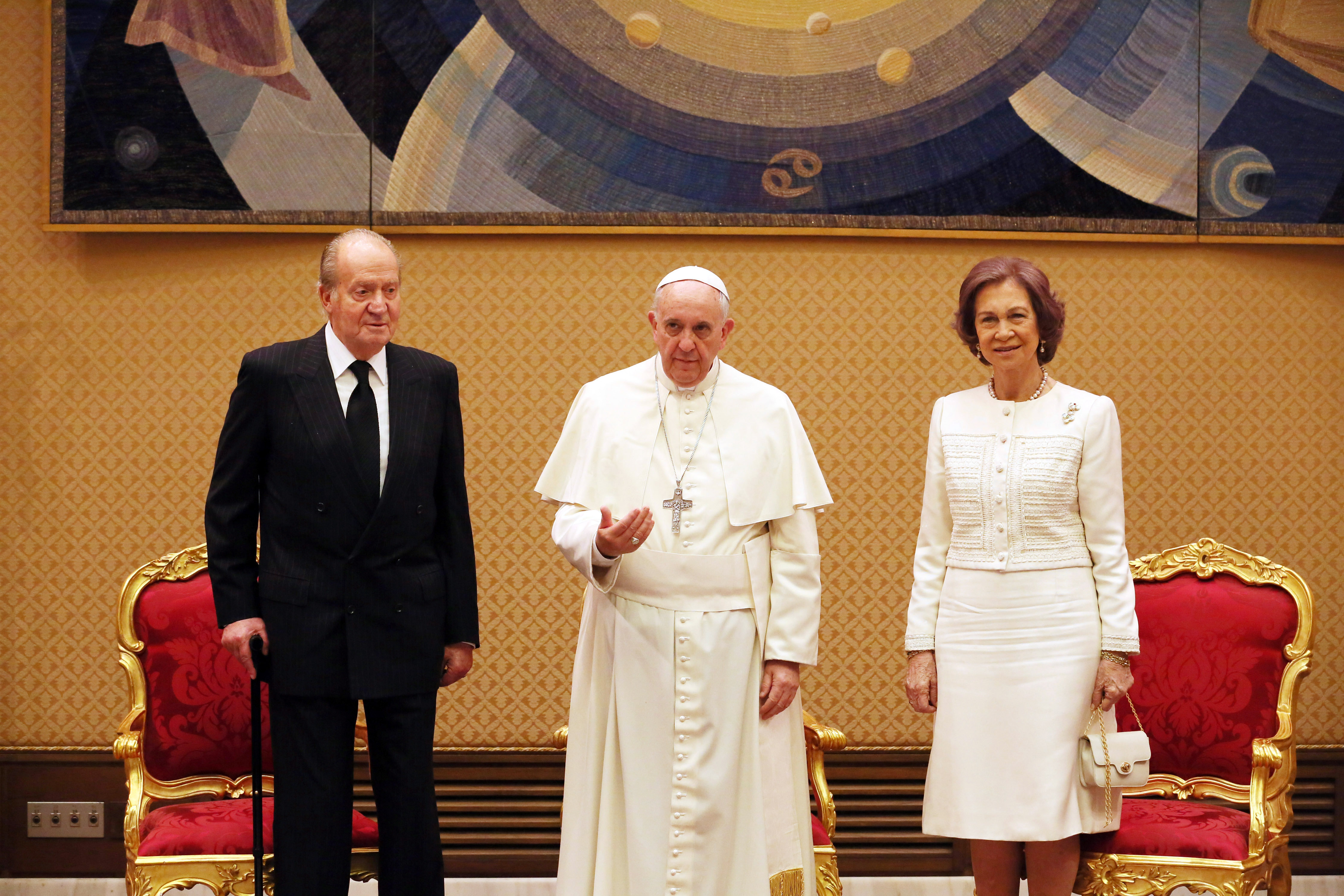
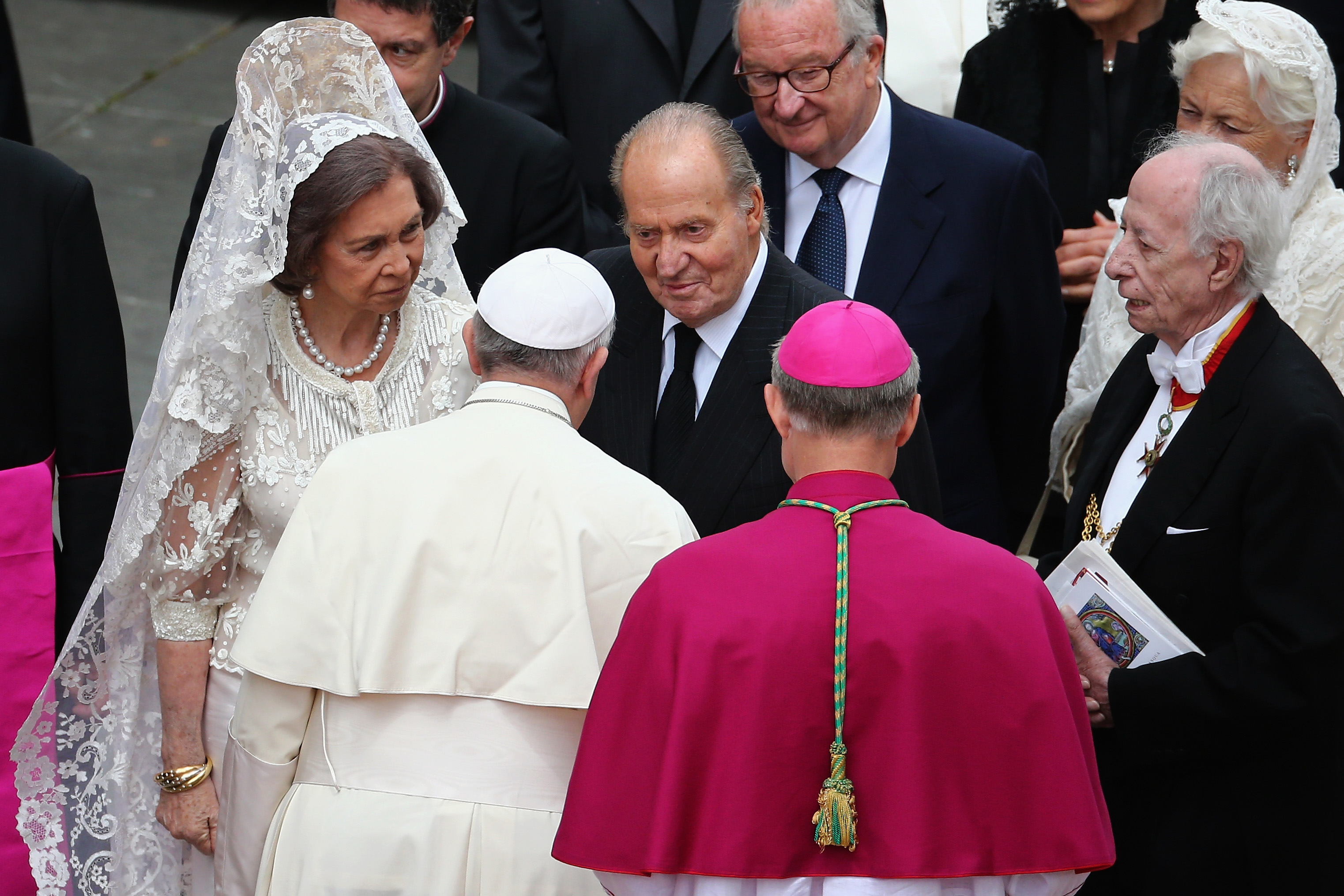
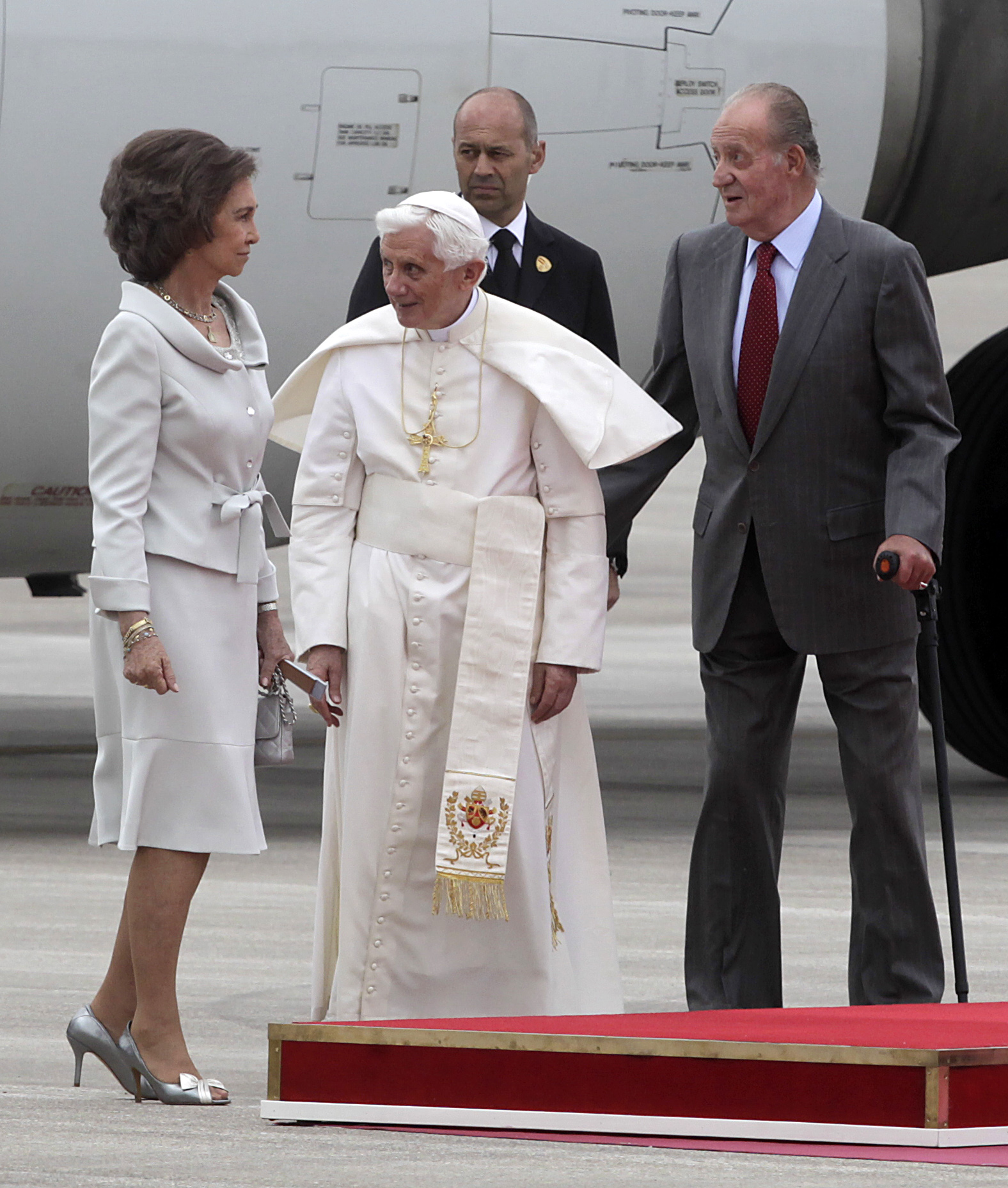
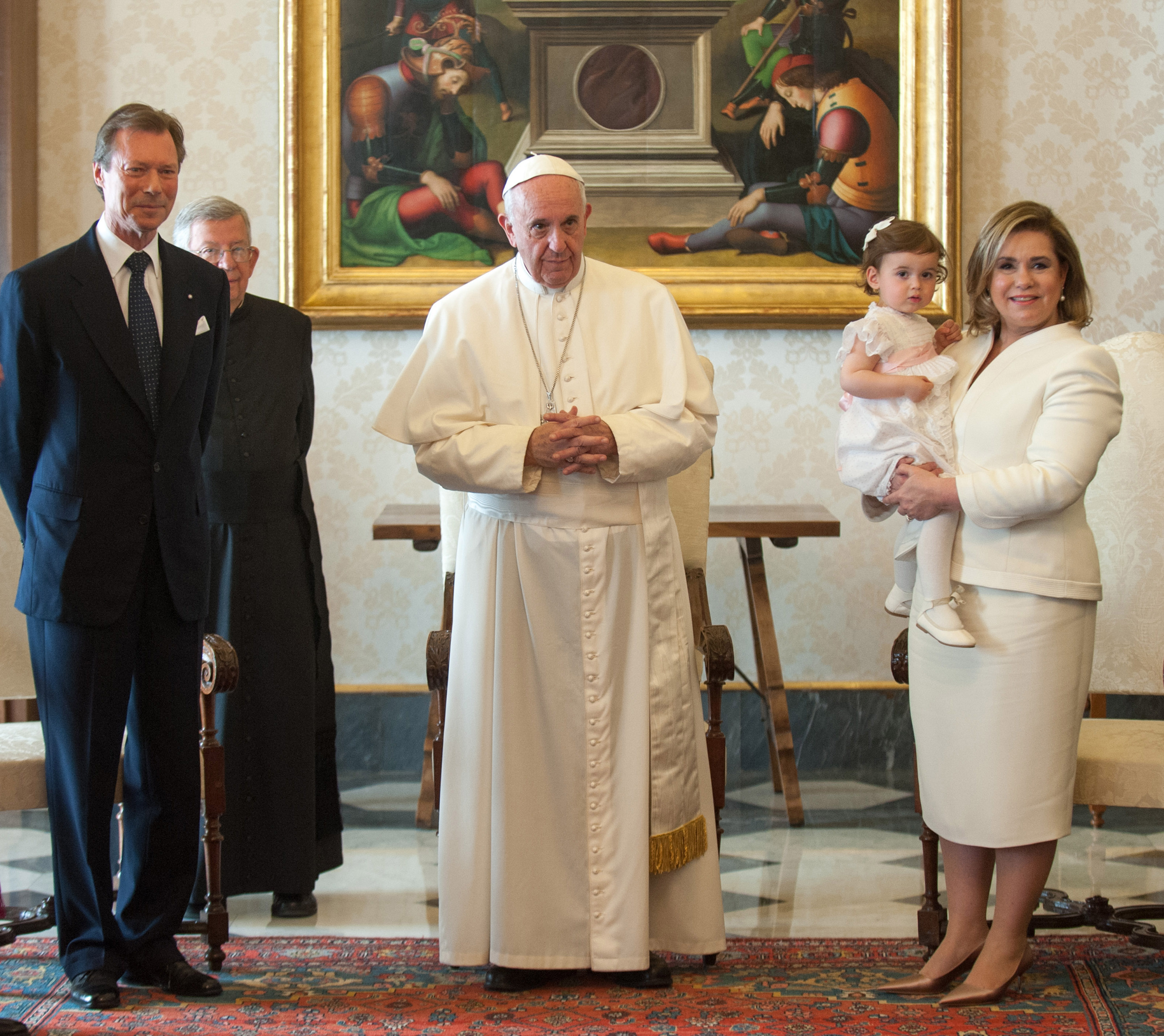
Wearing white, the color of the pope’s cassock, or invoking the “privilège du blanc” is not an option for funerals, as the rule does not apply. The privilege is symbolic, representing purity, innocence, and peace.
According to reports, it is a mark of honor for royal houses that have maintained strong ties to the Catholic Church. The seven royal women permitted to wear white around the pope during certain events have maintained this tradition throughout the years.
Queen Sofia of Spain
On February 10, 1997, Queen Sofia was pictured wearing all white, including a veil, while meeting Pope Paul VI with King Juan Carlos and other Spanish royals.
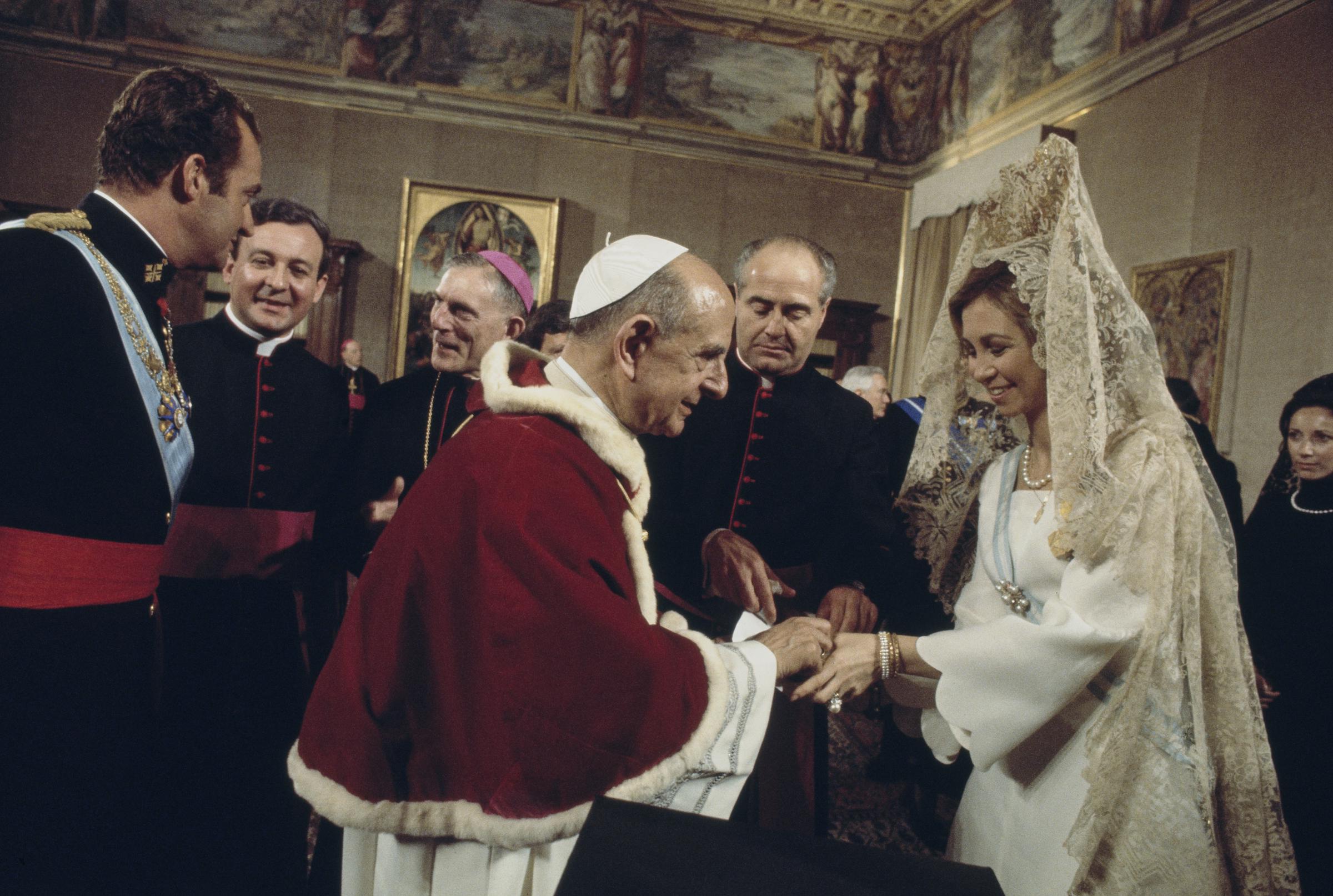
Queen Letizia of Spain
When Queen Letizia met Pope Francis with King Felipe VI at his private library in the Apostolic Palace on June 30, 2014, in Vatican City, she was dressed in white. This marked her first meeting with the former head of the Catholic Church since Felipe VI became king.
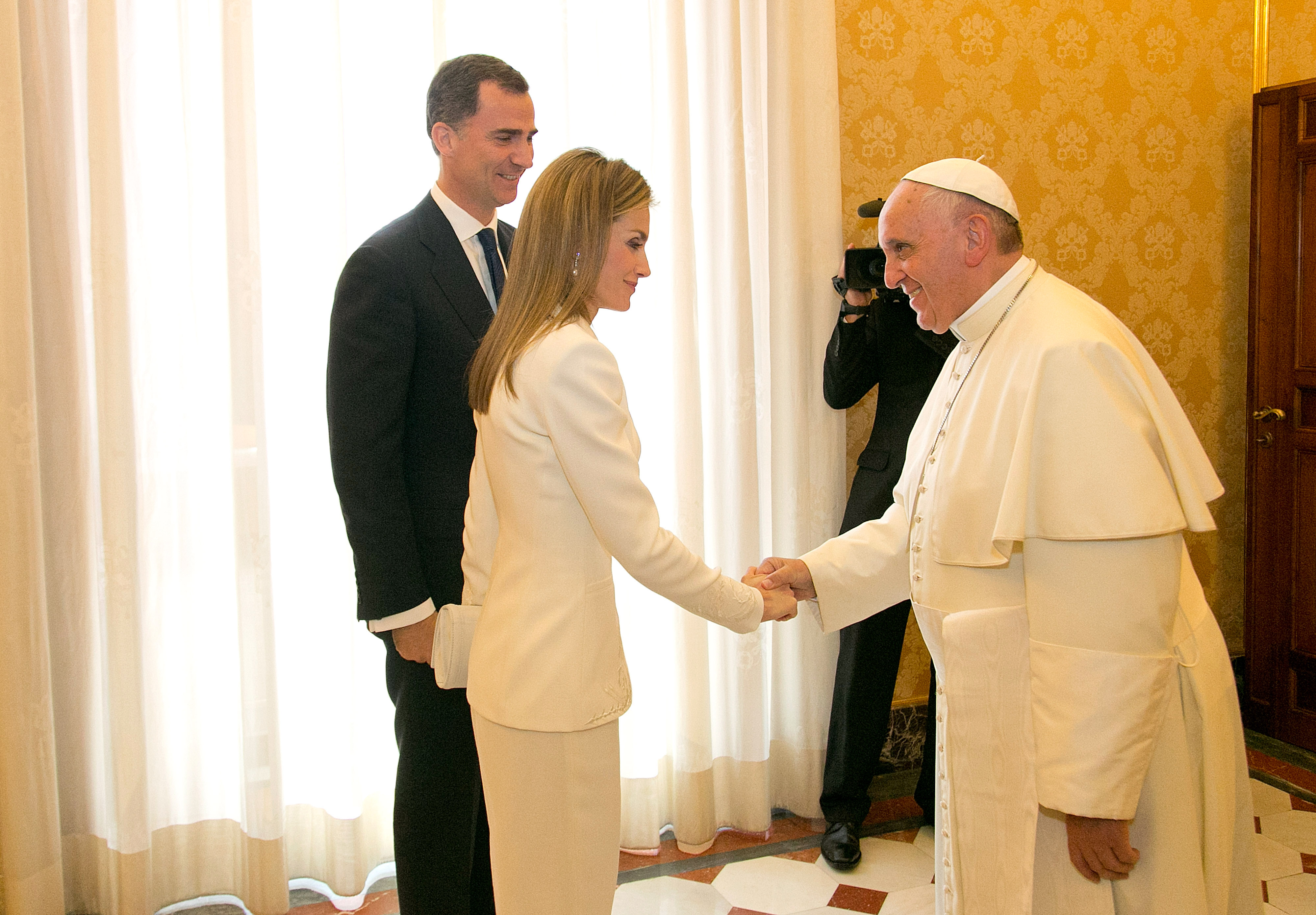
Queen Paola of Belgium
White clothing and a veil were the order of the day when Queen Paola met Pope John Paul II at his private library in the Apostolic Palace on May 15, 1998, in Vatican City.
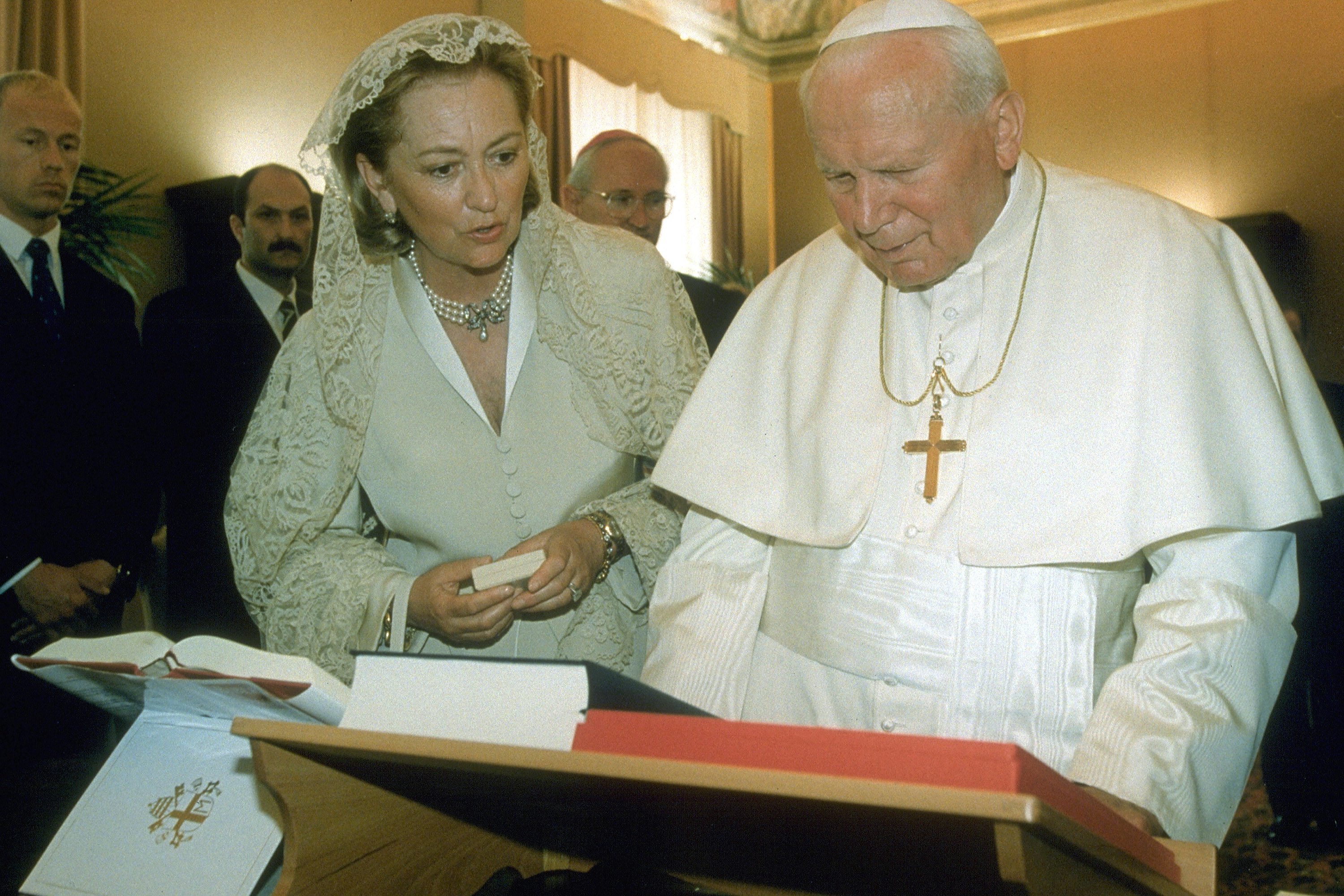
Queen Mathilde of Belgium
On March 9, 2015, when Queen Mathilde met Pope Francis, she graciously received a rosary during a private audience at the Vatican while wearing all white.
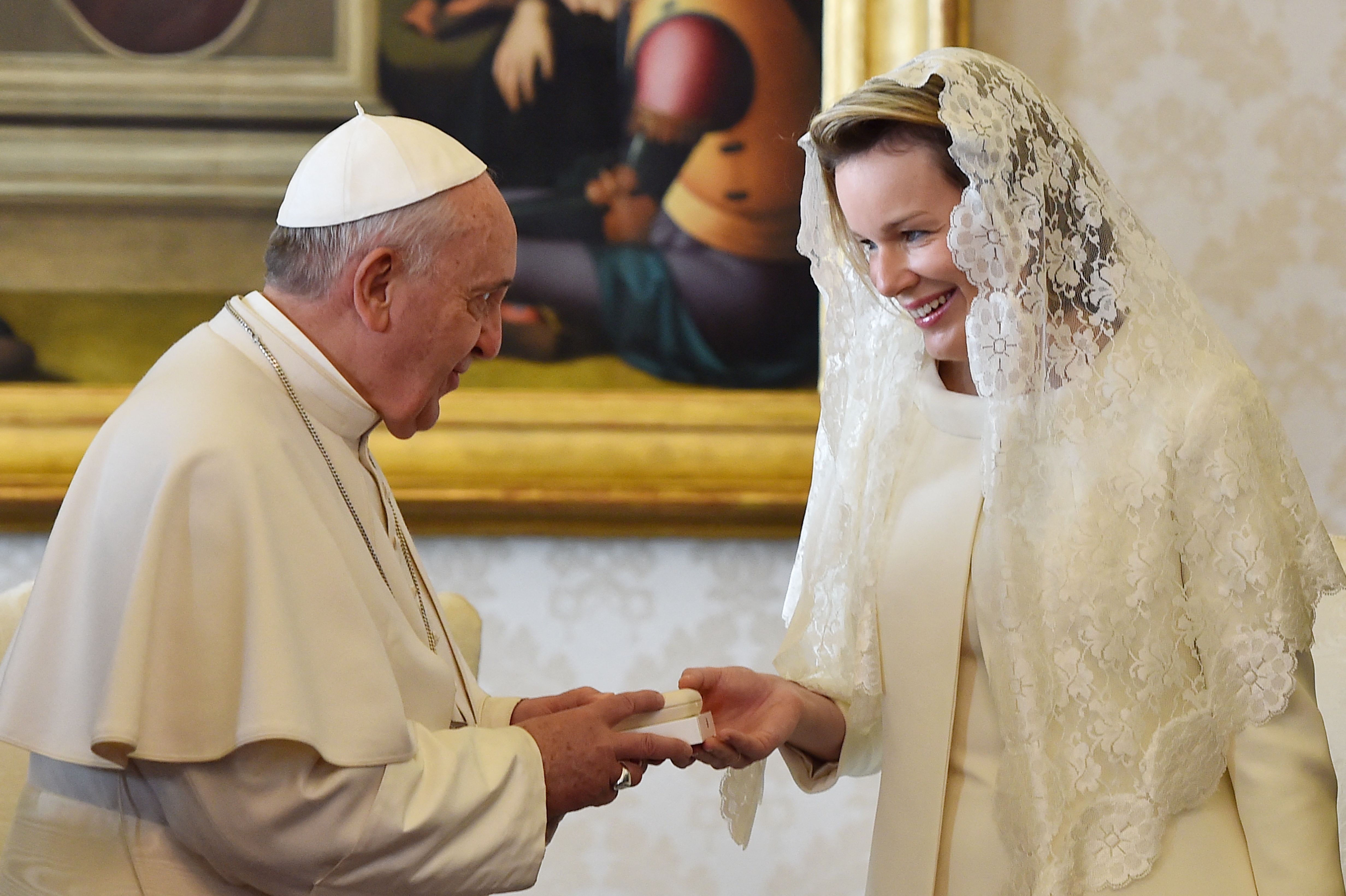
Grand Duchess María Teresa of Luxembourg
Grand Duchess María Teresa wore a white veil and clothing when she received a rosary from Pope Benedict XVI during an audience at his private library at the Vatican on May 8, 2006.
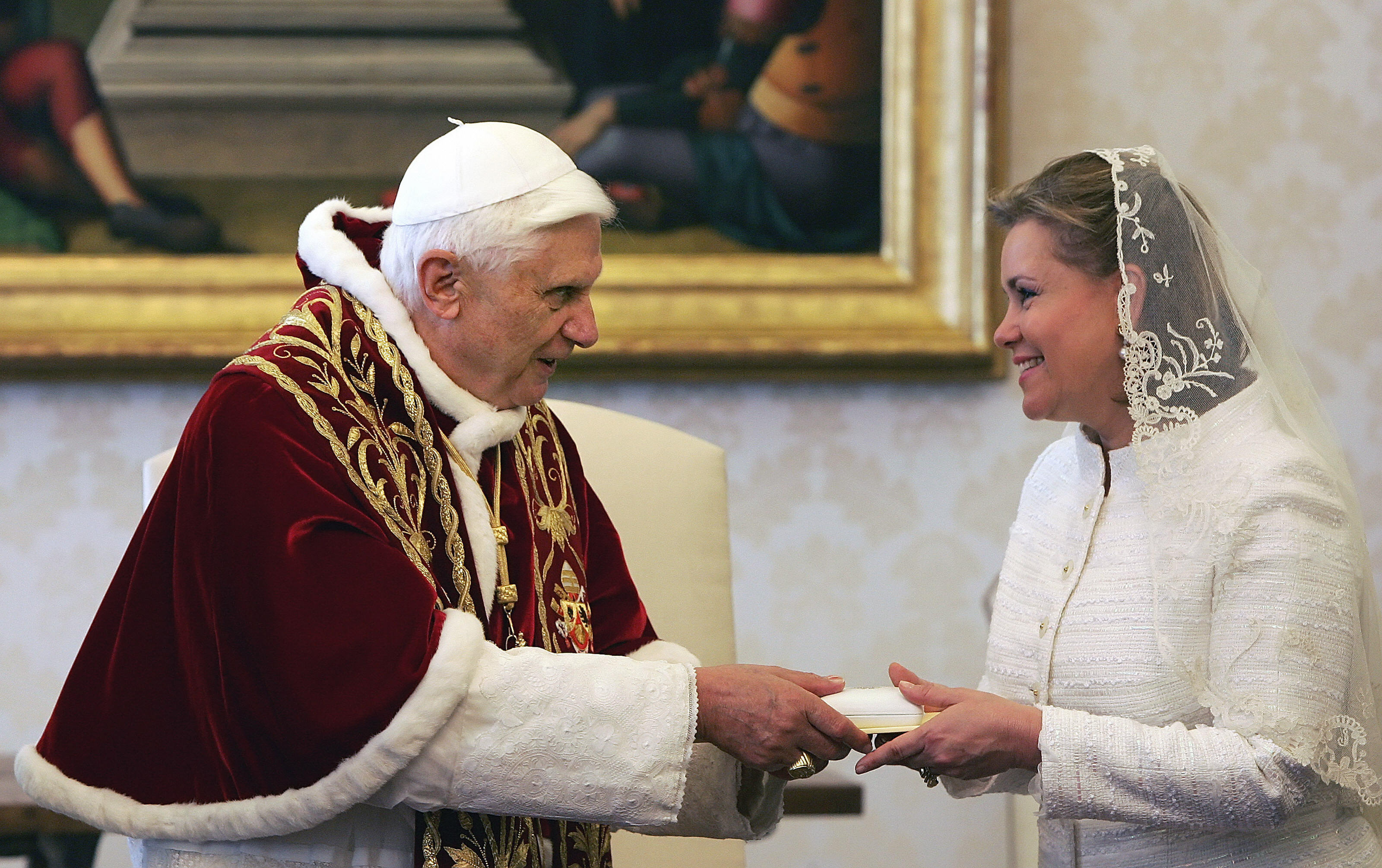
Princess Marina of Naples
On May 18, 2003, Pope John Paul II acknowledged bishops, Emanuele Filiberto and his mother, Princess Marina Doria, and his father, Prince Victor Emmanuel, while arriving in St. Peter’s Square in his popemobile for a special mass in Vatican City.
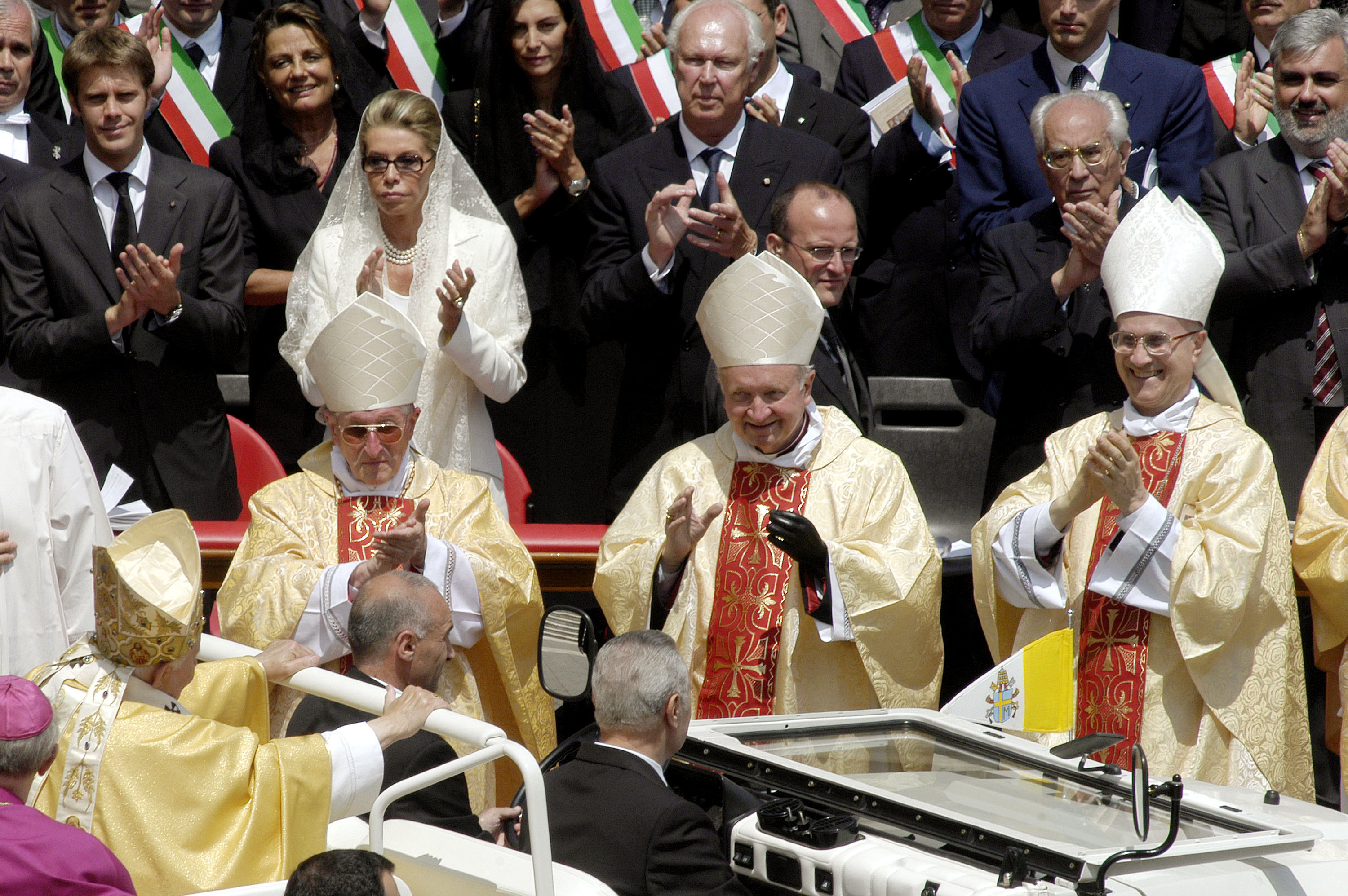
Princess Charlene of Monaco
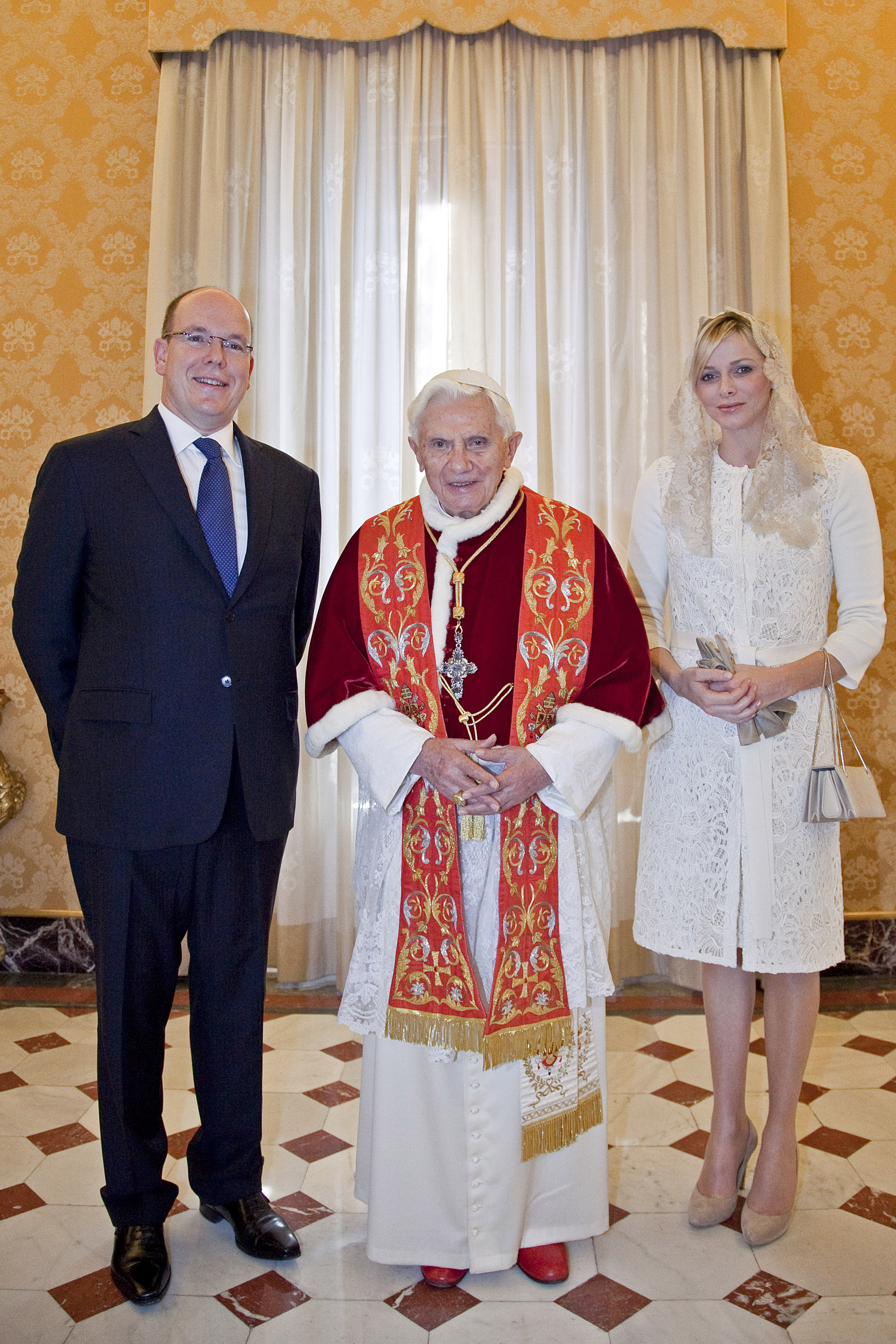
The last royal permitted to wear white on certain occasions, Princess Charlene of Monaco, wore the attire when meeting Pope Benedict XVI with Prince Albert II of Monaco during a private audience at his library on January 12, 2013, in Vatican City.
